#the light on george's face...this is cinema...
Explore tagged Tumblr posts
Text
George's reaction to Max's guess | x (update!! the video is from Mercedes' insta but the audio is cut from later in the fan forum; sadly we must only imagine George's real reaction until Mercedes hopefully drops the full vid!! Thank you @rb19 for the correction! 💞💞 I think I'm too unaccustomed at digesting tiktok content lol. I'm easily tricked!!)
#MERCEDES DROP THE FULL GEORGE REACTION NEOW PLEASE#my typical content dilligence zapped in a moment of gax joy. alas#anyways the tags from when life was more golden ->#i wanted a version without those godawful masks#because I need to yell about THIS MOMENT#the light on george's face...this is cinema...#max verstappen#george russell#also kimi and yuki but I don't wanna clog their tags with my self indulgen gax'ing#god these two make me feel wild#universe if you're reading my blog please give me a gax title fight and if they are teammates that would wild#maxcedes can happen only if gp goes too tho...#anyways i gotta schindig tonight irl where No One at the club will care about f1#.....yet 😈✨ hehe jk but hopefully will have more blogging time tomorrow!!!
55 notes
·
View notes
Text
Misunderstanding
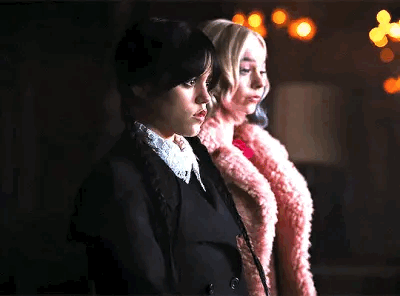
Prompt: Amidst the glitz and glamour of the entertainment world, Y/N finds herself entangled in a web of emotions. Navigating the captivating landscape of her newfound celebrity life, her heart becomes a battleground between two captivating co-stars, Emma and Jenna. The boundaries between fiction and reality blur, leading Y/N into a maze of confusion. With Emma's vibrant charm and Jenna's enigmatic aura, Y/N grapples with a choice that could redefine not only her on-screen performances but also the very fabric of her personal bonds. Blinding lights cast shadows on her feelings, leaving Y/N torn between two captivating forces in a world where fiction collides with reality.
Wordcount: 1.9 k
Pairing: Jenna ortega x reader
Author: sorry for this shit
It's amazing how a simple pastime can turn into an extraordinary opportunity.
My world, where I enjoyed imitating movie characters in online videos, was shaken by the surprising news from Tim Burton. The master of dark cinema personally chose me for a role in the second season of Wednesday Addams. The transition from a simple pastime to a set with a professional cast, a renowned director, and a real dressing room is something I could never have imagined.
I was nervous as I watched the cast of the first season, observing me with enthusiasm and joy, new faces to see and integrate into the plot. I felt like a deer caught in the headlights, taken aback by all this unexpected attention.
"Welcome!" Hunter, a guy with puffy brown hair and a perpetual smile, extends his hand to greet me. With a small smile on my lips, I accept the greeting and chuckle with embarrassment. "Thanks," I reply with flushed cheeks, not sure why I should thank him.
"Finally! I was tired of always working with the same faces," Joy intervenes with a smile on her lips. The girl had a drink in hand and raises it to her mouth, drinking its contents. "You're always friendly, Joy," George, a guy with curly hair and sweet coffee-colored eyes, smiles at his friend with amusement. "Welcome," he adds, smiling broadly.
"Hi!" My eyes turn to the sound of the voice, and I see a girl with short brown hair and piercing blue eyes. I smile nervously, recognizing Emma Mayers: the actress was notably more beautiful in person. "You must be my new love interest," she adds, widening her lips in a beautiful smile, blue eyes looking at me attentively. "Yes..." I chuckle weakly, nervous.
I can't deny that the fact that I'm her new love interest embarrasses me: I'm not entirely sure I can pretend to flirt or kiss someone for pretend. I shudder at the mere thought. "Well, because George was a terrible experience," she says, smiling mischievously, trying to downplay the situation.
"I love you too, Em," the guy called George intervenes, rolling his eyes at her comment. The blonde laughs, and the sound of her laughter makes me shiver slightly, increasing my nervousness and causing the blood flow to stop on my cheeks. "I know," Emma sticks her tongue out at George, and he imitates the gesture.
My attention is captured by a couple talking to each other, conspiring who knows what. The guy laughs softly and puts his arm around the shoulders of the shorter girl who looks at him with a small smile on her lips. I recognize the couple as Jenna Ortega and Percy White. I had heard rumors of a possible romance between them, but I thought it was nothing more than a rumor: I knew the media always wanted to meddle in the lives of the famous, spreading gossip and causing a stir on the web with sensational news. But the way they look at each other and touch makes me feel a lump in my throat.
Percy directs his gaze at me and smiles broadly.
"Hi!" The brunette takes his arm off Jenna's shoulders and walks towards me. "Welcome, we're glad to have a new addition to the cast," he says, smiling with genuine happiness and kindness.
Jenna's eyes are fixed on me, and my body is suddenly invaded by shivers and excitement, my heart beating wildly. The series' protagonist approaches with an enormous smile on her lips, and my knees wobble at the beauty she radiates: Brown eyes, dazzling smile, dimples on her cheeks, and freckles surrounding her face.
"Welcome," Jenna smiles genuinely and wraps her arms around my neck, hugging me tenderly. I reciprocate the hug with surprise, sighing audibly at the moment I feel her perfume invade my nostrils. The scent of what seemed like vanilla made me smile timidly.
Jenna breaks the hug and smiles genuinely at me.
"Want to take a tour of the place?" Emma intervenes quickly, approaching us. Jenna looks at her co-star with curiosity and simply takes a step back, getting close to Percy, always glued to this guy. I sigh audibly and smile at the blue-eyed girl with enthusiasm, nodding. Emma smiles triumphantly and takes my wrist. "Can I join?" Hunter says eagerly, and George looks at us attentively.
"Me too," George says pouting, and Emma nods enthusiastically.
(...)
Three weeks have passed since my arrival, and despite having a great relationship with the entire cast, Jenna, Emma, and I were practically inseparable. My feelings are a whirlwind of chaos and insecurity, not knowing exactly which girl to choose. Emma, a beautiful and friendly girl who is always ready to help me when needed, or Jenna, the stunning brunette, kind, and affectionate, but suspected to be linked with Percy.
I tried talking to George and Hunter, and both advised me to make a decision before ruining the friendship between Jenna and Emma. I didn't even know if they felt the same, and the idea of choosing one of them scared me. The most selfish part of me suggested keeping both, but my heart didn't want to suffer and, above all, feel guilty.
"Hey," I divert my attention from my thoughts and unconsciously smile when I see Jenna standing near me. "Can I sit?" She asks curiously, chewing her lip nervously.
My eyes carefully watch her gesture.
"Sure," I say, taking off my sweatshirt and placing it behind my chair. Jenna adjusts herself and crosses her legs, her thigh pressing against mine. "Are you going over the scene?" She asks curiously, her eyes watching the script in my hands. Shivers run down my spine feeling the contact of her leg with mine, the warmth emanating from her body.
"Yes..." I clear my throat, and Jenna nods, smiling shyly. I immediately notice Jenna shivering from the cold, and I worry about her. "Do you want my sweatshirt?" I ask with genuine concern, and Jenna denies, pushing a strand of hair away from her face. "Sure? Are you cold" I raise an eyebrow in confusion, and Jenna sighs loudly, shivering once again. The brunette nods slowly, and smiling, I take off my sweatshirt and hand it to her. Jenna puts it on, looking incredibly adorable as it hangs loosely on her.
"Thanks." Jenna smiles genuinely and comes closer, resting her head on my shoulder. Emotion grows inside me, and I nervously smile. I look down, and I see Jenna's hand brushing against mine. Gathering courage, I grab it, intertwining our fingers. I feel Jenna's pulse racing under my touch, her arm relaxing.
"So..." Jenna says in a low voice, breaking the silence around us. "Do you have a boyfriend? Girlfriend?" She asks with curiosity, looking at my script resting on my legs. Jenna's thumb absentmindedly caresses the back of my hand, making me shiver slightly. In reality, I'm confused because I don't know if I feel something for Emma, but in simple terms, I'm not in a relationship. "No... what about you? Are you with Percy, right?" I ask with my heart in my throat, nervousness running through my body. Jenna raises her chin and looks at me with confusion.
I was afraid to hear her answer. Jenna breaks the contact between our hands.
"Percy? No... we're just friends." She says, smiling broadly, and I suddenly feel stupid and relieved at the same time. "Oh... I thought so," I say with flushed cheeks from embarrassment, and Jenna smiles, shaking her head. "I know... the internet spreads rumors," Jenna murmurs, puffing irritably, "but... Percy and I have nothing," her eyes sparkle as she looks at me. I couldn't help but get lost in her gaze, two coffee-colored puddles analyzing me carefully.
"Mmmh..." Jenna clears her throat and looks away at her hands, "have you set your eyes on someone?" She innocently asks, playing with her fingers. Someone? Actually, two, but obviously, I couldn't say that. "Maybe..." I say hesitantly, and Jenna looks at me from the corner of her eye, an involuntary smile spreading across her lips.
"You?" I ask with embarrassment, and Jenna nods, making a face. The blood boils in my veins at the thought of Jenna being in love with someone else. "Oh... who?" I ask almost in a whisper.
Jenna looks up, observing something in the distance. George, Emma, and Joy walking side by side, laughing, and saying some nonsense. I follow her gaze, and disappointment fills my body seeing that she was looking at George. The curly-haired guy laughs softly while playfully pushing Joy. Emma, on the other hand, looks at me with interest, smiling broadly, her beautiful smile printed on her lips. Involuntarily, I smile too, and Emma keeps looking at me, bright and lively eyes.
"Do you and Emma go out together?" Jenna asks quickly, her gaze suddenly becoming serious "No," I say with confusion, and Jenna continues to look at me attentively. Occasionally, I could sense the brunette putting up a barrier with the outside world, but I really wished she would show herself as she was. I wanted to get to know her and make an impression. A part of me wanted to do the same with Emma but the latter was already quite extroverted, and it was easy to read her emotions. Jenna, on the other hand, was unreadable.
"Oh..." Jenna looks at me with embarrassment, and I smile at how adorable she is. "I know who you like," I intervene, and Jenna's eyes widen, her body stiffening at my words.
"You have to tell him... you know?" I say with a bitter smile. Jenna softens her gaze and continues to look at me, her thoughts and feelings unreadable.
Him? She says spontaneously.
"I'm sure George will feel the same," I say, smiling broadly, hiding my pain, and Jenna snorts with frustration. "It's not George," she says with irritation, making me blink in surprise at her reaction.
Emma walks towards us and stops in front of me. I look up, and Jenna looks away towards the floor. "Y/n, shall we walk a bit? We need to rehearse," Emma says, smiling broadly, her eyes curiously looking at Jenna. The brunette was silent, her hand gripping the chair arm tightly noting Emma's interest. "Um... sure," I say, smiling slightly, following Emma.
Let's start walking without a specific destination, simply enjoying each other's company.
"So... I noticed there's something between you and Jenna," Emma says, smiling weakly, walking alongside me. The girl with blue eyes puts her arms behind her back, walking absentmindedly.
"What? We're just friends," I say nervously, my heart pounding wildly against my chest. "But you like her, right?" She asks with a faded smile, her blue eyes looking at me attentively. "Yes," I say, not being able to lie to her. Emma lowers her gaze and looks at the tips of her shoes. "But I also like you... I'm really confused," I continue suddenly revealing a truth I wanted to keep hidden.
"I like you too... but Jenna is my friend," she says, smiling broadly, her eyes bright at the mention of her friendship with Jenna. "Jen is really introverted and hard to understand... I don't want to lose her friendship," she confesses, continuing to walk alongside me.
"Why should you lose her friendship?" I ask in confusion, and Emma rolls her eyes at my comment. "It doesn't matter," she says, laughing and elbowing me in the side. "So..." I say, and she quickly interrupts me, "I'm sure you like Jenna more, I think the on-set kisses confused you," she says with sadness, her blue eyes losing their liveliness.
"Emma..." I say sadly, feeling a void in my chest. "I told you she and Percy are not together, right?" She asks, and I nod, "but despite that, you still weren't sure," she says bitterly, looking at the floor. I feel a pang of pain in my chest and nod quickly, unconsciously knowing that Emma was right.
"Don't worry about me, I'll manage," Emma smiles genuinely and chuckles, but her eyes are dull.
"Okay," I say uncertainly, "so let's remain friends," I say almost bitterly, and Emma nods her head, "friends," she repeats weakly. "Sorry, but I have to go," Emma adds quickly, her steps increasing considerably.
I watch Emma walk away from me with sadness.
...
That same night, I found myself at a small party with the cast, Emma, and Georgie, dancing animatedly together. A part of me was sad, but at the same time, Emma had given me the green light with Jenna, and I had to move forward. I was slightly jealous of Georgie, I admit.
My eyes were on Jenna, who was leaving the party, and I unconsciously followed her.
As I open the door, the cold cuts my cheeks, and darkness surrounds us, a pleasant silence accompanying us.
"Do you need some fresh air too?" Jenna asks while lighting a cigarette; she was so damn sexy. "Yes, I love Hunter, but his trailer is too small," I laugh, and Jenna just stares at me.
"So... do you like Hunter? But I'm sorry because you know that he..." I start, but Jenna quickly interrupts me, smoke escaping from her lips. "Why do you assume it's a he?" she asks almost angrily, and a shiver runs down my spine at the intensity of her gaze. "Alright... so Joy?" I say, smiling slightly, sad but ready to support her. I had already lost Emma, and the chances of losing Jenna were skyrocketing.
"No!" Jenna throws the stub on the ground, looking at me with shining eyes. Her cold and exasperated response surprised me. Jenna sighs in frustration, crossing her arms to seek warmth. I hated not being able to read what she felt and thought; it was so damn difficult.
"Why do you care?" she asks defensively, and I sigh at her comment. "I want you to be happy," I confess, and Jenna stares at me without batting an eyelash. Her eyes soften, and she takes steps toward me. "It's you," she whispers.
I blink incredulously, and Jenna smiles genuinely. "Me?" I say with a smile on my lips, curious.
"Yes, damn it!" Jenna says, frustrated. "But I was afraid you liked Emma, and I care about her friendship," she confesses later.
"I like her... but I like you more," I admit, and she looks at me seriously, something incomprehensible swimming in her eyes.
"Am I not the second choice?" she timidly asks, the barriers she had finally broken ready to rise again to defend her emotions.
I shake my head; honestly, I liked Jenna from the moment I saw her.
Sensing the tension in the air, Jenna delicately bites her lips, then sticks out her tongue to moisten them. My eyes follow her with admiration, caught by the gesture exuding sensuality.
Red, full lips, so kissable.
Without warning, Jenna leans in, her presence intensifying the atmosphere charged with desire. With confidence, her lips meet mine in a long-awaited kiss. Jenna's strength and energy transmit through the contact, while the moment becomes charged with palpable passion. Jenna's hands firmly grip my shirt, and mine find her hips almost immediately, pulling her closer. During scenes, Emma used to kiss me tenderly, slowly, without invading my space too much, which was completely the opposite of what Jenna was doing.
Oxygen soon runs out, and we break the kiss, my nose brushing against hers, my eyes able to see the freckles around her face. "Wow," Jenna says, smiling widely, her breath slightly infused with alcohol. I smile too. Jenna wraps her arms around my neck and hugs me gently. "I'm glad you didn't do anything with Emma," Jenna says, smiling against my neck. I smile bitterly and let myself be carried away by the hug and her intoxicating scent. "Yeah," I say weakly, and Jenna tightens the embrace.
I had chosen Jenna, and there was no turning back.
#jenna ortega x reader#jenna ortega#jenna ortega x you#jenna ortega x y/n#jenna ortega x fem!reader#wednesday addams x reader#miércoles addams#emma myers#love triangle
251 notes
·
View notes
Text
Cosplay the Classics: Alida Valli in Walk Softly, Stranger (1950)


My closet cosplay of Alida Valli in Walk Softly, Stranger
The Star
When Alida Valli arrived in America, she arrived with ten years of screen experience under her belt and thirty credits—a substantial resume for a twenty-six-year-old. By the 2000s, Valli had committed over one hundred roles to film, on top of her television and theatrical work. In her seven-decade film career, Valli demonstrated outstanding versatility as genres shifted and styles evolved. In a half dozen countries, a bevy of heavy hitters directed her: Alfred Hitchcock, Pier Paolo Passolini, Luchino Visconti, Carol Reed, Mario Bava, Georges Franju, Margarethe von Trotta, Dario Argento, Bernardo Bertolucci, Michelangelo Antonioni, and Claude Chabrol, to name just a few.
She became one of the most accomplished performers to ever emerge from Italian cinema, though Alida Valli’s American period seems like a footnote to her rich biography and filmography. (With the exception, of course, of the British-American production, The Third Man (1949)). How did Hollywood stardom evade such a talented, experienced young actor with a face that photographed beautifully from every angle? Well, let’s begin at the beginning.
Alida Altenburger, later Valli, was born in what was Pola, Italy—and is now Pula, Croatia—to a noble family that would soon relocate to Como in the north of Italy. When Alida was in her teens, she enrolled in the Centro sperimentale di cinematografia in Rome to study screen acting. The young Alida must have displayed some natural talent because her first film credit came just a year or so later.
Valli quickly became a popular star—primarily in telefoni bianchi (White Telephone) films. Telefoni bianchi was a film genre/stylistic movement aesthetically characterized by art deco. The films often depicted luxurious and/or bourgeois lifestyles; as a white telephone was a symbol of status, it in turn became a symbol of the genre. Telefoni bianchi films are typically comedic or light in tone and they avoid suggestions of intellectual depth or addressing social issues. As you probably already know, to consciously avoid “politics” is always a political decision. This movement was part of a broader push under Mussolini’s National Fascist Party to cultivate an aspirational fiction of affluent urbanity and to forge a new ideal of Italian-ness based largely on consumerism and consumer goods. The relatively carefree lifestyles depicted in the telefoni bianchi films was far removed from the lived reality of the majority of Italians during the global depression of the 1930s.
(Oversimplified-but-probably-necessary historical notes here: Italy as a single, unified nation was only about sixty-years-old at this point; meaning a unified sense of Italian-ness was kinda new. Then, in the first half of the twentieth century, Europe saw huge cultural and social changes engendered by industrialization, imperialism, and war. Use of mass media was a key factor in the nationalist goals of Mussolini’s government to shape a new new definition of modern Italian-ness.)
The rise of telefoni bianchi films was in large part due to Italy cutting down on importing American movies in the 1930s. Telefoni bianchi were one way to fill that gap, not simply by reflecting the polish and sheen of Hollywood productions but also by retooling American-style propaganda for Italian audiences. The emphasis on simplified narratives in telefoni bianchi stories, where any problem can be faced with good, traditional values and hard work, is a direct descendant of similar American films of the period. [1]

Alida Valli in the telefoni bianchi film Ore 9: lezione di chimica (1941)
Likewise, up-and-coming stars, like Alida Valli, were built up to replace (and hopefully surpass) American stars who were popular in Italy. One fan magazine somewhat superficially compared Valli to Loretta Young. They were both fresh-faced starlets who started to work professionally from a very young age, but their typical roles and styles of characterization were very different. However, I do think it’s worth noting that both actresses were often paired with older male leads early in their careers. The teen-aged Valli made multiple films with Amadeo Nazzari, who was fourteen years her senior. Teen-aged Young had some of her first major roles opposite Lon Chaney (thirty years older), Conway Tearle (thirty-five (!!!) years older), Ronald Colman (twenty-two years older), and John Barrymore (thirty-one years older). Additionally, in my opinion, playing in adult roles so young had the unintended consequence of both actresses playing more mature roles sooner than seems logical.
Of this period in Valli’s career, in his book Mussolini’s Dream Factory, Stephen Gundle wrote:
“Valli was predominantly an ingénue. She played fiancées, schoolgirls, daughters of industrialists and taxi drivers, dancers, secretaries and students. She was one of the many new faces that lent their countenances to a gallery of female types that corresponded to roles available to young women at the time.”
The two most cited films of Valli’s telefoni bianchi era are Mille lire al mese / A Thousand Lire per Month (1939) and Ore 9: lezione di chimica / Schoolgirl Diary (1941). I have yet to track down a copy of Mille lire, but, if Ore 9 is a representative indication of Valli’s telefoni-bianchi work, the reason for her massive popularity is clear: Valli’s Anna has youthful exuberance tempered with an acerbic and headstrong edge. From a technical perspective, Valli displays sharp comedic timing and perfectly executed control over her voice, facial expressions, and body language. (These are skills I knew Valli had from her later work, but it is a revelation to see that she already had them at only 19-20 years old!)
Though she was a staple star of telefoni bianchi, Valli branched out into more dramatic roles by the end of the decade; making a mark especially in period dramas. The characterization that first proved Valli’s dramatic chops was Luisa in Piccolo mondo antico / Old-Fashioned World (1941). Piccolo mondo was part of yet another emergent, albeit short-lived, Italian cinematographic movement: calligrafismo. This movement was more stylistically diverse than telefoni bianchi, but has likewise been criticised for avoiding deeper themes or social commentary. Calligrafismo films focused on formal sophistication—meant to emphasize film as art and Italian technical prowess—and literary source material—usually from the 19th century. Piccolo mondo is a lauded representative of calligrafismo and its director, Mario Soldati, is considered one of the movement’s premiere practitioners.

Alida Valli in Piccolo mondo antico (1941)
Valli’s character Luisa is a woman of bourgeois status who marries a nobleman for love and has to suffer the consequences. The events of Piccolo mondo take place over the course of a decade and so the then twenty-year-old Valli had to play Luisa as: a hopeful but anxious young bride, a faithful and self-possessed wife and mother, and many stages of extreme grief over the loss of a child and estrangement from her husband. Giving such a role to a performer that young, I think, could easily result in histrionics, but Valli genuinely pulls it off. Valli managed to give Luisa dignity and melancholy that belied her performer’s age. Her work particularly in the last third of the film is very strong and effectively heart-rending.
At the start of the decade, Valli firmly established the breadth of her technical abilities as an actor, but, in 1943, Mussolini’s fascist regime collapsed. Reflecting later in 1965 on her work in the 1930s and early ‘40s, Valli stated:
“I was a young girl, 16, 17, 18 years old and I was successful and privileged. Everything was easy and when things come to you easily you do not stop to ask if things are right or not. I made films as automatically as a secretary types a letter. If no one explains to you what evil is, how do you know what is evil? … I never thought that a cinema like that [i.e. white telephone films] was wrong or that it would end, because no one thought that Fascism would end.” [2]
Valli’s candor here is appreciated; highlighting the ignorance that privilege can breed. It’s a strange position for a teenager to be in, not formally tied or allegiant to Fascism, but still part of the corporatist machine that props it up.
The new government of Italy signed an armistice with the Allies, but then Nazi Germany invaded and occupied the north of Italy. The majority of professionals in the film industry, which was centered almost exclusively in Rome at the time, refused to collaborate with the invaders. Some filmmakers fled to Venice to establish a film colony there. Valli made the decision to “retire” from acting. Her refusal to work on films for the occupiers made Valli a target, but, with the help of friends, she was able to stay in her beloved Rome, albeit in hiding. It was while Valli was in hiding that she met and married her husband, musician Oscar de Mejo.
Valli’s “retirement” ended in 1945, though she had not been absent from Italian screens in the interim, as her earlier films were still circulating. Valli soon had an especially well-regarded turn in Eugenia Grandet (1946) as the long-suffering daughter of a wealthy miser. Valli’s performance as the title character displays all of the variety and depth she had cultivated in her first decade in film—and it was captured beautifully by cinematographer Václav Vích. Returning to the screen after the war, and contending with your star image potentially being associated with a fallen fascist regime, must have been massively challenging for the twenty-five-year-old. Despite her success in Eugenia Grandet, the potential of a fresh start in America must have seemed promising for Valli—with her husband and baby in tow, of course.

Alida Valli in Eugenia Grandet (1946)
Unfortunately, the notorious David O. Selznick was the one who scouted Valli.
The first film she made for Selznick was The Paradine Case (1947), directed by Alfred Hitchcock. Valli was still learning English while the film was in production and, as a result, had to study her lines phonetically. You would never guess that watching the film as Valli gives a layered performance with intriguing nuance in much of her line delivery. The Paradine Case had a troubled production and it is understandably regarded as a lesser film of Hitchcock’s, Valli’s work is the strongest aspect of the film.
Selznick’s plans for Valli lacked forethought and were in no way based on her versatility or unique skills as a performer. Selznick’s marketing for the star harped on her becoming the next Bergman or Garbo, rather than the first Alida Valli. Starting with Valli’s very first Selznick production, rather than getting a typical title card for her credit, she was represented solely as “Valli” with a cursive namemark. Selznick explained this odd decision as a way to evoke Garbo-ness. (Although, it was actually Nazimova who originated the namemark gimmick in the US.) The “Valli” gimmick did not offer the mystique Selznick had imagined. Alida Valli herself recounted how foolish the marketing was if for no other reason than that there was an established, popular star called Rudy Vallée around. Having David O. thoughtlessly micromanaging her star image meant that Valli’s adjustment to the Hollywood system of filmmaking was the equivalent of playing on hard mode.
“‘In Europe, actors are just people. We have to do things for ourselves,’ she explained. ‘But suddenly, I sign the American contract, and everything is done for me as if by magic. I am no longer a person—I am a Thing.’” —Valli quoted in “Double Life” by Inez Robb in Modern Screen, June 1948[3]
Valli’s second American film was the forgettable The Miracle of the Bells (1948). However, while The Third Man would be Valli’s next release, the film I’m cosplaying here, Walk Softly, Stranger, was already in the can. Selznick disliked the original ending of WSS and demanded re-writes and re-shoots. Selznick’s ending satisfied no one. Howard Hughes, whose distribution company, RKO, was handling the film’s release, reportedly chose to shelve WSS. But, after the success of The Third Man, Hughes wished to capitalize on the pairing of Joseph Cotten and Valli. WSS was un-shelved nearly two years after it was produced; unfortunately retaining its egregious, tacked-on “happy” ending (which I’ll talk more about later).

Portrait of Alida Valli from Modern Screen, June 1948
After her fifth film, The White Tower (1950), Valli bought herself out of her contract and returned to Europe. Why Valli left so abruptly is likely a mix of personal and professional issues. While filming The White Tower, Valli was having marital issues and she was pregnant with her second child. According to Valli, Selznick did not want his star to be pregnant. Working under Selznick seemed nightmarish. In addition to the ridiculous constraints on how she was meant to conduct her personal life, it must have been clear to Valli by 1950 that she would never have the opportunities to build a career with the same range that she had proven herself capable of in Italy.
Why Valli left Hollywood is maybe not such a great mystery. Regardless, it’s also clear that if the rigid studio system had thoughtfully cast Valli in higher quality material and/or allowed her to do comedy—something she brought up multiple times in the press while she was in the US—the American viewing public might have had a better chance to appreciate her skill. Selznick instead took a stellar actress and limited her to a knock-off Bergman. What a massive waste.
Valli’s American period was inarguably difficult, but it seemed to galvanize her for her return to Europe. Despite a rather large hiccup in her personal life that affected her career in the early 1950s, Valli found international acclaim. Valli not only worked in her native Italy, but also Spain, France, Britain, Mexico, and, yes, even the United States again. From the 1950s to the 2000s, Valli traversed new genres, styles, and movements freely and with dauntless creativity. If you mostly know Alida Valli for The Third Man (or perhaps for her supporting roles in giallo classics like Suspiria (1977) or Lisa and the Devil (1973)), take this essay as a prompt to check out more of her work! I plan to as well because I’ve seen her in over a dozen films and still feel like I’ve only scratched the surface!
——— ——— ———
[1] I’ve seen the work of Sicilian-born American director Frank Capra listed as a primary influence on these films—something I’d like to research further to be perfectly honest!
[2] from O. Fallaci, ‘Lo specchio del passato’, L’Europeo, 14 January 1965. but cited from Gundle’s Mussolini’s Dream Factory. Gundle doesn’t specify, but I assume this is his own translation from the original Italian.
[3] If you’ve researched fan magazines before (or have read any of my “Lost, but Not Forgotten” series), you already know that the historical value of fan magazine profiles and interviews is less about facts and more about what they express about what stars/their management/their studios wanted the public to think about them. For example, highlighting that a star is an avid reader to give the viewing public the notion that the star is intellectual or focusing on a star engaging in domestic activities to create a wholesome image. Though I’m using what isn’t likely a direct and unedited quote from Valli here, she expressed very similar sentiments in television interviews in France and Italy in the latter half of her life. So, while anything printed in these profiles should typically be taken with a grain, or a whole shaker-full, of salt, having the same sentiment spoken on camera by Valli herself makes this quote more compelling in its accuracy!
——— ——— ———
The Film

Joseph Cotten and Valli in Walk Softly, Stranger
To defer to Eddie Muller: Walk Softly, Stranger is a noir “near miss.” Rather than a proper film noir, it’s a romantic melodrama with a little noir seasoning, marred by studio interference. But, WSS’s complicated romantic storyline and noir-ish subplot, not to mention great performances by the leads and support, stick with you—even if the aforementioned tacked-on ending spoils the final effect.


My closet cosplay of Alida Valli in Walk Softly, Stranger
A Mysterious Stranger (Cotten) arrives in Ashton, a picture-postcard of small-town America—down to the big factory owning practically everything in said small town. With a touch of recon, the stranger ingratiates himself to a magnanimous local widow, Mrs. Brentman (Spring Byington). She even helpfully produces his pseudonym for him: Chris Hale, the boy child of the family who lived in her house before her. In this opening sequence, Chris is established as an adept wheeler dealer.
After securing lodging, Chris’s next target becomes Elaine Corelli (Valli), the daughter of the factory’s owner. Chris lays it on thick, but he’s missing a key bit of information: Elaine is now in a wheelchair. A few months prior to their meeting, Elaine took a bad fall on a ski jump and took permanent damage. So begins a fraught love story between Chris and Elaine.
Chris starts getting comfortable in his new identity. He has a home, a job, friends, a doting auntie, and is dating the richest girl in town. What’s initially meant to be a chance to lie low starts to seem like a genuine second chance at a normal life. The suspense kicks in when this unexpected peace is put in jeopardy as a character from Chris’s old life shows up in town unannounced. When Chris is eventually cornered by his criminal former cohorts, it results in Chris getting ventilated, a massive car accident, and then, unexpectedly, Chris still alive and headed to prison.

Collage of the hair and makeup reference photos of Valli I used for this cosplay
WSS is a languidly paced movie, matching the sleepy-but-contented nature of Ashton. It’s an unsung example of one of my favorite narrative devices: the city as a character. Personally, I think this is a key reason why WSS’s ending is so jarring. Ashton is socially stratified, but it’s still a town with communal spirit. It’s exactly this spirit that gives Chris the false hope of a fresh start—a nostalgic yearning not for what-was but for what-could-have-been. In the original script’s ending, Chris’ death is implied and Mrs. Brentman passes along the poem “John Brown’s Body” to Elaine. It’s a melancholic ending that both matches the Sehnsucht-ish tone of the film and taps into the film’s theme of alienation within an idyllic image of the American Dream. The re-worked ending has a rambunctious energy, nonsensical Will-Hayes-ian logic, and a troubling continuation of Chris and Elaine’s relationship.
In addition to the regrettable ending, I also feel that WSS missed an opportunity to examine Elaine’s character arc thoughtfully. Elaine first appears alone on the patio of the Ashton country club while there’s a lively party going on inside. We get to know Elaine along with Chris; as we share his perspective for the whole of the film. It’s clear that her recent disabling event has left her in a well of self-pity. There’s not much time devoted to Elaine’s new quotidian reality, because the film is really Chris’ story. So, a lot of what we learn about Elaine is indirect. For example, we learn how long it’s been since Elaine’s accident via a social column. From the way Elaine speaks and the micro-expressions and reactions that Valli registers, it can be inferred that Elaine was a social butterfly before her St. Moritz accident—but also that her social circle was composed of fair-weather friends. Elaine is almost always by herself when we (and Chris) encounter her. This makes her seem not only chronically isolated, but vulnerable. And, since we know Chris is not exactly on the level, this creates an interesting tension that the filmmakers seem only mildly aware of.
Much of Elaine’s dialogue about herself is rife with internalized ableism. She even goes so far as to liken her current state to death. Of course, Elaine is still new to her disability and the grief experienced during the adjustment period from able-bodied to disabled in an ableist society is real and common. WSS would be a stronger film if this element had been examined with a bit more perspective. The film does, however, touch on a complicating factor to Elaine’s experience of disability: the privileges she’s afforded as a wealthy person. Even though Elaine is often reliant on others to compensate for the lack of accessibility you would expect in 1940s America, she has the resources and capacity to take long trips and go out and socialize. There’s certainly no hint of trouble in paying medical bills—she’s literally the richest girl in town. Addressing Elaine’s social and economic privilege is not very thoughtfully done however, as Chris’ challenge to Elaine’s self-pity is flattened into patronizing abled savior type stuff.
That said, to Chris, Elaine is neither a target of pity nor someone who needs to be taken care of. She’s simply a very pretty, very rich girl that he’s very attracted to. Her disability is not coupled with any infantilization or inherent character defect—both all too common tropes in Hollywood films. I’ll admit, for a film to admit that a woman being disabled doesn’t make her less desirable is nice to see (and unfortunately is still a novelty), but how WSS handles it leaves a lot to be desired.

Alida Valli in Walk Softly, Stranger
There’s more depth to Elaine than we usually get for disabled women on film—particularly women with visible disabilities—even though she’s not a fully-developed lead. Valli’s performance imbues Elaine with intellect, dignity, and complex, layered emotions. There’s a scene shortly before the climax of the film where Elaine and Chris have an earnest conversation about where they stand with one another. It’s revealed that Elaine has known Chris was a phony from their very first meeting when he slipped up with one of his lies. Through this one reveal, we learn by implication that Elaine was never a dupe and that in those situations where she seemed vulnerable to him, she wasn’t. Regardless of how many windows Chris entered by unbidden, Elaine had more control of the situation than we, and Chris, realized.
Chris’ and Elaine’s arcs in the film align in that both learn to accept a new way of life. For Chris, it’s about recognizing that he can, in fact, lead an honest life and that he’s entitled to one (after righting his past wrongs of course). For Elaine, it’s recognizing that St. Moritz was not the end of her life and that her future will be different but still full of potential. This theme of new life is sublimated in the scene where Chris and Elaine lay their respective cards on the table—this discussion doesn’t take place in the library, where they normally hang out, but in a solarium surrounded by lush plants.
WSS careens disjointedly into its final sequence. Chris has survived an encounter with a gambling kingpin and he’s serving time. (For which crime though? And under his assumed name?) Elaine is there to meet him as he’s transferred from the hospital ward to the penitentiary. Elaine explains that she’s going to wait for him. This revelation is couched in a self-hating, ableist monologue. Where it seemed just a few scenes ago that Elaine was making progress, suddenly she thinks that she and Chris will “deserve” one another more when he’s an ex-convict, broken by the system. (???) Her own estimation of herself should have transformed by this point in the story. In what’s supposed to be a hopeful coda, any suggestion of character development for Elaine is summarily wiped out.
All that said, I still recommend checking out WSS. It’s a nuanced, affecting melodrama and a complicated entry in the evolution of disability representation in Hollywood films. The dialogue is snappy and it has an interesting story structure; buffeting between the relative peace of Ashton life and Chris’ criminal undertakings. Alida Valli and Joseph Cotten are always worth watching and Spring Byington is as delightful as ever as the lonely and sweet landlady.
If you’d like a noir-inspired double feature with Walk Softly, Stranger, Out of the Past (1947) also features a former criminal who tries to find a new life on the straight and narrow, which turns out to be too narrow. Or watch it with Hollow Triumph (1948), where a criminal tries to hide out in a small town by taking over a local’s identity. (An added benefit to HT is that it has some entertainingly off-the-wall plot devices.)
——— ——— ———
☕Appreciate my work? Buy me a coffee! ☕
——— ——— ———
Further Reading/Viewing
Mussolini’s Dream Factory: Film Stardom in Fascist Italy by Stephen Gundle
Spellbound by Beauty: Alfred HItchcock and His Leading Ladies by Donald Spoto
Il romanzo di Alida Valli by Lorenzo Pellizzari and Claudio M. Valentinetti
The RKO Story by Richard B. Jewell and Vernon Harbin
Alida / Alida Valli: In Her Own Words (2021)
#Alida Valli#1940s#1950s#cosplay#film#cinema#american film#classic movies#classic film#cinema italiano#film stars#filmblr#film history#history#David O. Selznick#film noir#noir#noirvember#robert stevenson#classic cinema#old hollywood#cosplay the classics#closet cosplay#classic hollywood#hollywood#Joseph Cotten
28 notes
·
View notes
Text
Show Me Yours | Matty Healy [36]
chapter thirty-six, act five: the ballad of me and my brain
masterlist
little Author's note /TW before this act begins. There's going to be alot of talk of drug use and addiction within the chapters coming, if you're not comfortable with these kinds of things please don't read.
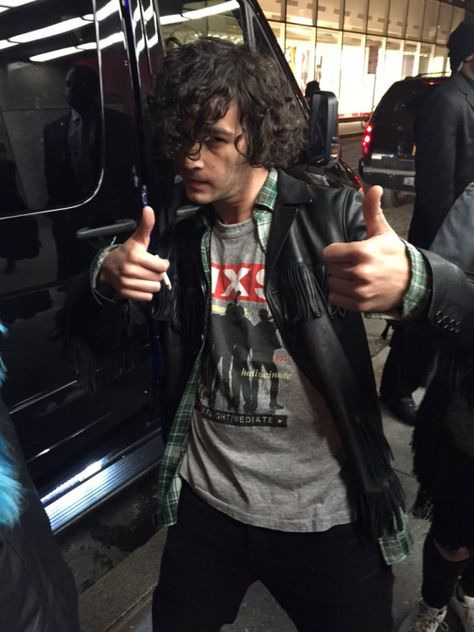
January 14th 2017
Tommie yawns, one big loud yawn as she shuffles through her house to the front door.
Gabby grins when it’s opened and tugs her little suitcase in behind her. “Hey, babes.”
“Gabs? What are you doing here?”
Gabby sighs, “I miss my best mate, is that a crime?” She asks kicking her shoes off and lining them up neatly besides Tommie who quickly shakes her head and opens her arms for a hug, “Haven’t seen you since Christmas, I missed you.”
Tommie smiles, breathing in slowly as she accepts the hug from her friend. “Okay, I have so much planned for us, tonight is movie night, tomorrow I’m driving us to Cardiff and we’re having a shopping day, monday we’re going to go to the cinema, I haven’t decided on tuesday yet, struggling between a pamper day and a trip to a beach, but that might be too cold now I’m thinking about it.”
“Okay, let’s start with movie day-”
“Okay, but I’m picking. I cannot watch Fantastic Mr Fox again.”
“But it’s my favourite.”
“It’s the only film you watch besides Revenge of the Sith.”
“They’re good films.”
⋆。 ゚☁︎。 ⋆。 ゚☾
The flashes are bright, too bright and she’d forgotten her sunglasses to protect herself from them.
The bag on her shoulder weighs her down more than everyone else, her laptop, books, writing books, hoodie and a pair of shoes she couldn’t fit into her suitcase make their weight known against her muscles.
Ross’ body blocks some of the light, but when he’s moved over by Jamie and towards the side her shield is gone.
The screams of teenage girls are too loud as they push against the old creaking barrier to try and get closer to Matty, he’s upfront, sunglasses and leather jacket on looking like a guy out of a Corey Hart song.
He revels in the attention whereas Tommie hates it, shying away as much as she can, hiding into the darkness of her hoodie as her hands fumble with the strap of her bag.
Then someone is breaking over the barrier, she can’t tell who gets over first, the fan or the rogue photographer.
They both shove each other, the poor teenage girl is on the floor, Tommie’s standing there above her, photographer’s camera in her face.
Without thinking she’s shoving the camera away, it clatters and smashes on the floor, hitting the girl who’s being helped up by other fans.
“Tommie! Tommie!”
Hands are gripping her from both sides of the barriers, the walkway hasn't been made big enough. Strangers are touching her and she holds her breath not to be sick right there.
“Tommie! Matty!”
Someone gripped her and pulled her into them, arms wrapped around and guiding her into the van, straight into the back.
George sits beside her, holding her hand in his lap as the rest pile in, Matty coming in last after signing a few screaming fans shirts.
Matty raises his brows as he peers over the drummer, but George shakes his head, wraps one arm around her, tugs her into his side and blocks her from the singer’s view.
“Tom.”
“Leave her be, Matty.”
“You alright?”
He ignores George and moves his arm to brush his knuckles across the top of her head, reaching around the back of George awkwardly to do it.
“Matty-”
“I’m fine.”
“You sure?”
George elbows him, giving him a look that he once again ignores.
“I’m fine, Matt.”
Her tone is sharp, and he leans back, taking his arm away and resting his hands in his lap. “Okay, I was just asking.”
“You’re always just asking.”
“What’s that supposed to mean?”
Ross looks between them slowly, the tension has been building between them for weeks and no one knows why.
Adam gives one harsh look to Matty and he’s pausing, shrinking back in his seat and mumbles an apology. “I jus-” He cuts himself off before he can finish the word, “I wanted to make sure you were okay.”
⋆。 ゚☁︎。 ⋆。 ゚☾
February 21st 2017
“Just be honest with me, Jamie. Be brutal. It’s bad.”
Jamie sighs, “It can easily be fixed.” He assures, “I’m sure Matty will do something bad next week.”
She sighs and leans forward, head in her hands, Adam moving to rub up and down her back, “God, this is bad.”
“It’s fine, it’ll blow over.”
“Yeah, but I-”
“So what? Have you seen the way the Gallaghers act? Or any other mildly popular artists? People have done worse.”
She looks at the newspaper on the table. An article about her blowing off the fans at the airport, talks of assault as she’d accidentally shoved someone in a hurry to the awaiting car.
The truth was the flight had been bad, she’d been seated beside Matty, the pair still haven’t talked since he showed up at her house, and with the show after show after show routine she’d already been on edge.
It’s all falling apart. Something she used to be so good at, touring endlessly with no rest, is no longer her strong suit.
And to top it off, she hasn’t seen Button in two months, the dog has been staying with her grandparents back in South Wales to give her a break from moving around.
Usually articles like these would mean nothing to Tommie, she’d brush it aside with a half-arsed shrug.
But it's the fact they’re dragging Caleb and his band down with her, knowing the 1975 are far too popular around the world to be touched by a little article they’ve targeted Dirty Delights.
She knows they probably won’t see this. It’s a European news outlet, there’s no chance, right?
Nope.
Caleb had called her the moment it came out.
That’s why she’s panicking.
She doesn’t want to ruin Caleb’s career before it’s even begun.
George sighs, finally sitting down, “It’ll be forgotten next week. They’ll start talking about Taylor Swift again or a shitty Kardashian boob job or something, don’t worry.”
She sighs, “What if this ruins Caleb’s career?”
“What career?” Comes a snort from across the room.
Ross smiles, but it's quickly dropped when he sees the glare that Tommie is sending to Matty across the room.
“I can’t be the reason his band fails before they’ve even had the chance to start.”
“They’ve had plenty of chances, they’re the ones who's fucking up. I wouldn’t lose sleep over it.”
“Matty-” Adam tries but Tommie’s standing now.
“You’re forgetting you guys were in a band for ten years before you got the chance.”
“Yeah, but we had fans. People who’d turn up to our gigs-”
“Oh, you mean your groupies who’d give you money to suck you di-”
“Alright.” It’s Gabby who’s breaking them up, brows raised as she looks between them weirdly, she sighs as she moves to Matty pushing him back down, “Shut up.” She tells him as she moves to sit on the other side of Tommie, bringing her back down to rub her arms.
“Give it a few days, ignore it, don’t comment on it. You get things like this all the time.”
She shrugs, picking at her jeans as she nods, “I know.”
“Never usually bothers you like this.”
“I know.”
Matty’s jaw wiggles as he watches his girlfriend comfort Tommie quietly, arms around her with Tommie resting her head on her shoulder.
The door opens then, Caleb steps in, eyes falling to his girlfriend who sits up quickly. He smiles walking over to greet her and she stands as he hugs her.
He mutters a ‘don't worry about it all, we’ll talk later’ and she nods quickly.
Then Jamie's standing too, “Come on, five minutes and you’re all on.”
On her way out he grabs her hand, “I’ll sort it.”
“Thank you.”
⋆。 ゚☁︎。 ⋆。 ゚☾ ゚
“I’m sorry.”
Caleb shrugs as they enter their hotel room in London, he sheds his jacket hanging it on the chair and starts unlacing his shoes.
“It was all too much, everything, I-”
“Babe.”
He turns, holding his hands out for her and she slowly accepts it, “It’s okay. It’s not your fault, I know how you get.”
“How I get?”
He nods, wincing at his words of choice, “You know what I mean.”
“No, no, I don’t.”
“Well, you’re… different, Tommie.”
“Different?”
He sighs, bowing his head, “I’m not winning this no matter what I say so whatever it is you’re building up to just get it out with.”
“I just want to know what you mean.” She says, knowing full well she does in fact know what he means, and she also is in fact building up to say something.
She sighs looking down, “I’ve always been called different, Caleb, but what does that mean?”
He sighs slowly, “You’re just… not like everyone else.” She raises a brow and he sighs, “It’s not a bad thing.”
She nods, then steps back shedding her blouse and jeans to put on her pyjamas.
“Tommie.” He says, watching her carefully, “You’re just a little more… I don’t know, sensitive I guess.”
“Sensitive?”
“Yeah. But also weirdly emotionless at the same time.” He says looking up at thought.
“I’m not different.” She says, as she glances up over his head at the mirror hanging on the wall to stare at herself. Picking apart everything, her straightened hair, the makeup still on her face, the gold necklace he got her for her birthday, the bags under her eyes, the little scar on her eyebrow from when she hit her head as a kid. It’s not her. It’s Caleb.
Straightened hair because he likes it like that, makeup left over despite how hard she’s scrubbed her face because she put so much on to hide the bags given to her by sleepless nights made no better by his comforting hands, a golden necklace replacing her favourite silver one because he caused an argument when she didn't wear it. The scar on her eyebrow he points out way too much, that he avoids touching when his fingers trace her features.
“I’m just me.”
Caleb watches her as she climbs into bed and hangs his head, “Tommie…”
“Goodnight, Caleb. Big day tomorrow.”
taglist
@thereisaplaceintheheart, @indierockgirrl, @sofaritsalrightt, @julezs-bl0g, @eaglestar31, @sophinthealpss, @noacfemcel, @if-my-heart-bleeds, @befrwime, @fallingforel, @sexorchocolateorpillowsorclouds, @3terna15unshin3, @1975sophie1975, @thesocraticjunkiewannabe, @littlesoldierelleora, @procrastinatinglikeapro
-let me know if you want to be added :)
60 notes
·
View notes
Note
what are your top five stories (books, movies, tv shows, etc) from the first half of 2024 and why! gush about it ❤️
omg that is SO HARD to narrow down!!!!!! THERE'S BEEN SO MUCH EXCITING CONTENT THIS YEAR! i'm gonna go with anything i've watched for the first time this year, whether it was a 2024 release or not
interview with the vampire season 2~ such a perfect, beautiful, incredible, amazing story. i had very limited faith that season 2 would rise to the heights of season 1 but BY GOD IT DID. and delainey brought so fucking much to the part, assad was genuinely astounding as armand, jacob continued to enthrall with even MORE sides to louis, sam did sooooooo much with such a limited role- we had such an embarrassment of riches with every fucking step. praying season 3 keeps up this level of quality but even if it doesn't, the story told here was so complete.
CHALLENGERS!!!!!!!!!! MOVIE OF THE YEAR!!!!!!!!!! tackling multiple eras at once, three distinct characters with three distinct dynamics between them, laying out plainly how these people function and why they need each other so deeply. SUCH A LESSON IN STORYTELLING JFC. enthralling cinema. soundtrack of all time.
suits............. LMAO. in searching for television that my father would like to watch that wasn't just another goddamn procedural, i stumbled facefirst into suits and my brain melted for 2 months. something about this show gripped me by the throat and didn't let go til i dragged @tchallaas into watching the whole goddamn nine seasons too. i don't know! i was just so invested and GRIPPED WHOLLY for 9 seasons straight. and then i turned around and watched all nine seasons again. FUCKIN LAWYERS AM I RIGHT.
the book of clarence~ i laughed, i cried, i yelled. this movie! this story told parallel to the biblical one smacked me right in the face. lakeith is fucking amazing. this covered so many genres? and yet it always flowed so well to me? it's funny to watch this movie dismissed either for being sacrilegious or preachy, but i guess i don't have a dog in that fight. i just felt touched, i felt moved. and i also laughed a fuckton.
the acolyte ~~~ THIS!!!!!!!!!!!! IS WHAT I'VE NEEDED FROM WAR STARS!!!!!!!!!!!!! i haven't felt so engaged in this universe since i watched the last jedi. and that was kind of the first time i felt THAT ENGAGED in this universe since i was a child with all my padme barbies. kind of a big deal for me!!!!!!! my baby twin sisters, that dichotomy of dark and light twins (i see u og star wars novels), whose roles aren't nearly so set in stone, some complex depictions of jedi masters, seeing a lot more of the world outside jedi shenanigans, REVENGE QUEST, fully canon dark side seduction, MANNY JACINTOS ARMS
so so so many honorable mentions, but i'll limit it to: shogun, lisa frankenstein, pokemon concierge, argylle, maxton hall, thelma, mary and george....... AND BAD BOYS RIDE OR DIE I SAID WHAT I SAID GOODBYE
9 notes
·
View notes
Text

Why Horror Needs Humor 🎃🧛♂️👻😱
If laughter allows us to cope with the trauma of being in the world.
When we think of the horror genre, we think not only of unsettling images, but of unsettling sounds. We think of the scores: the screeching strings of Bernard Herrmann’s anxiety-inducing music for Psycho, the intensifying dread of John Williams’s iconic two-note theme for Jaws, the mid-melody modulations that derange John Carpenter’s piano pieces in Halloween.
We think of the screams of the scream queens (and scream kings), from high-pitched whistle-tone shrieks to guttural bellows. We think of the thwap of a smooth axe chop, the crack of breaking bones, the snap of twigs in a dark forest, the creak of footsteps on an old wood floor, and the susurrations of strange winds. We think of the creepy cadences of “A boy’s best friend is his mother,” of “You’ve always been the caretaker,” of “They’re coming to get you, Barbra.”
Yet, unsettling though they may be, none of these are the sounds that disturb us most in a horror film. No, the most off-putting things to hear in horror are neither score, nor scream, nor sound-effect, nor speech; they’re the paroxysms of laughter that erupt from villain or victim. It doesn’t matter which; they’re terrifying either way.
“Our laughter,” according to writer V.S. Pritchett, “is only a note or two short of a scream of fear.” Perhaps this is why humor and horror, which on the surface seem to be representations of opposing human emotions, make natural bedfellows. In fact, with the possible exception of romance, horror is the film genre most willing to rendezvous with comedy. Comic impositions in the genre have been with us since the dawn of cinema. Early forays into horror territory by the Lumière Brothers and Georges Méliès often included humorous elements: dancing skeletons, spectral pranksters, and plenty of scared people’s pratfalls.
As the film medium grew throughout the silent era, horror and comedy continued to further intertwine. By the advent of the sound era, certain aesthetic and thematic genre elements became codified in the Universal Studios horror template—and a little comedy came along for the ride. We laugh almost as much as we shudder when we watch those classic Universal movies: Dracula, Frankenstein, The Mummy, and The Invisible Man.
The success of 1948’s Abbott and Costello Meet Frankenstein—where Universal poked fun at its menagerie of monsters—opened the door to parodies of both specific horror films and more general horror film conventions, a door through which many movies later marched: The Comedy of Terrors, Young Frankenstein, Attack of the Killer Tomatoes, Student Bodies, The Slumber Party Massacre, Scary Movie, Shaun of the Dead, Cabin in the Woods, etc. Sure, there are sci-fi-comedies and action-comedies and western-comedies, but the horror-comedy, like the rom-com, has almost graduated from a sub-genre to a distinct genre in its own right.
Perhaps the only thing keeping horror-comedy from becoming a full-fledged genre is that it might actually be redundant: the horror genre itself is a genre of both horror and comedy. Few are the horror films that don’t evoke some laughs. Sometimes the laughs are broad and cheap, sometimes they’re dark and distasteful, but yuck needs yucks. Defining a distinction between horror and horror-comedy becomes useless when faced with films like A Nightmare on Elm Street, Scream, The Texas Chain Saw Massacre, American Psycho, and Psycho. These are funny films—and they’re all the more terrifying because of it. All dread and no play would make horror a dull genre.
The horror genre uses comedy in two ways. The first is to relieve the tension that the terror winds tight. Here humor is respite and release valve. Levity allows the audience to breathe, to have a bit of fun between the frights. These light moments allow us to see the people in a horror film as human, to connect with them, to empathize with them. When we see some high school kids laughing it up at a party or ribbing one another between classes, we’re reminded of our own friends. This also makes the frights all the more successful because not only has the comedy gotten us to care for these individuals, but it’s lulled us into a false sense of security. Our body relaxes—but not for long.
Though fun is usually associated with positive traits and likable characters, the horror genre also turns this natural order on its head, by making the villains the ones that seem to be having even more fun than our heroes: Freddy Krueger with his slapstick of the abject, Ghostface with his taunting phone calls, the Invisible Man’s silly transparent pranks, Pazuzu’s jouissance in sacrilege, Annie Wilkes’s gleeful fandom, the dinner-table play of all the Sawyers and Leatherface’s jovial chainsaw ballet under the blistering Texas sun.
Even killers who seem less outwardly giddy, like Michael Myers, still manage to have some fun. In the original Halloween, Myers makes time to dress up like a ghost with glasses for one victim and sets up his bodies in house-of-horrors fashion for another. If we find ourselves laughing along with these monsters and murderers, the humor may be working in a second way: ratcheting up the tension rather than releasing it.
The jokes of the Joker—the greatest horror villain to never feature in a true horror film—might make us laugh, but they rarely make us comfortable. In The Dark Knight, which is more of a horror film than most realize, the Joker’s devil-may-care attitude tempts us to see the world from his point of view: “Now I see the funny side. Now I’m always smiling.” But the humor is always tinged with not just disregard for human feelings (a not uncommon thing for “edgy” comedians), but disregard for actual human life. The violence that undergirds the maniacal humor is perhaps best illustrated by the Joker’s Glasgow smile, but it is also perfectly expressed in the “S” he or one of his clown minions have spray-painted on a stolen semi-truck. The message on the side of the truck, which once read “Laughter is the best medicine,” now reads “Slaughter is the best medicine.”
If laughter is indeed the best medicine, if it allows us to cope with the trauma of being in the world, the Joker highlights how it can also become the worst disease. When everything is funny, then seriousness becomes suspect: “Why so serious?” But in a world without seriousness, there is no empathy, no care, no camaraderie, no civilization; there is only the cold, continuous laughter of a sociopath. Of course, the Joker is so scary precisely because we sense there might be some truth to his outlook, even if we see the horrifying consequences of venturing too far down that path.
The Joker is but one of a seemingly infinite rogue’s gallery of laughing villains, the most horrifying wretches of all: Freddy Krueger, who’s constantly howling at his own one-liners; Chucky, the chuckling homicidal doll; Dr. Giggles, whose tittering sounds exactly as you’d expect; Patrick Bateman, with his variety of laughs; and all the Deadites, and the objects they possess, like that wall-mounted deer head that erupts in the most cartoonish cackles.
Maniacal laughs are not unique to horror; they’ve been a staple of a particular baddie archetype since before cinema even existed. And they’ve become such a common cinematic trope that The Muppets was able to have a villain who just repeats the phrase “maniacal laugh” over and over rather than actually laughing maniacally. (A perfect Muppet gag.)
The laughing villains need not be literal clowns, though evil clowns are quite common in horror: there’s Pennywise from It, the clown-shaped aliens in Killer Klowns from Outer Space, Art the Clown from the Terrifier films, Captain Spaulding from Rob Zombie’s Firefly Trilogy, the grinning clown toy in Poltergeist, even Michael Myers commits his first kill dressed as a clown in the original Halloween.
But the laughing villains do act as tricksters and jesters who mock us by holding a mirror up to society. They show us, in the words of the Joker, “how pathetic [our] attempts to control things really are.” They are cracked looking-glasses, in which we see a broken reflection of ourselves. In this act, we are confronted with how incongruous our beliefs, our rituals, and our rules are with the world in which we exist.
These laughing villains in a way reverse that V.S. Pritchett axiom, “Our laughter is only a note or two short of a scream,” to tell us that, in fact, it is our screams which are only a note or two short of a laugh.
In A Nightmare on Elm Street, dreams are called “incredible body hocus-pocus,” but the definition is as apt a description of laughter. Laughs are one of the most mysterious mechanisms of the body. We laugh for all sorts of reasons: we laugh to release tension and discomfort, we laugh to commiserate or empathize, we laugh out of schadenfreude or superiority, we laugh resignedly in the face of our own defeat, we laugh at absurdity and nonsense, we laugh amid confusion, and sometimes we can’t even explain—perhaps don’t even know—why we laugh.
But the one thing all laughs have in common is that they are a response to incongruity. In noticing such incongruities, we tiptoe around the madhouse. Yes, every laugh, from the smallest chuckle to the loudest howl, is a moment of minor madness making itself known. When Norman Bates says in Psycho that “we all go a little mad sometimes,” he’s not wrong. We do—we just call it laughter.
In this way, the laugh is never solely releaser or ratcheter of tension; it is always both. In our minor madnesses, we “see the funny side” of everything—which does, on the one hand, bring us joy—but we also, in the words of another Joker, “dance with the devil in the pale moonlight.” Through the laugh, we tango with the terrifying chaos at the core of existence; we become one with the horror.
This makes us, at least in the moment of our outburst, like the Invisible Man in The Invisible Man, whose experiments with invisibility have turned him “raving mad.” Our laugh, like his, can feel disembodied, like it erupts not from any visible self, but from some invisible navel-cord that links us back all the way to the primordial ooze of the universal incongruities from which we emerged.
But a laugh, even that of the Invisible Man, is always embodied. A laugh is a presence. A laugh implies a personality. There is no objective laughter, even if it arises from universal incongruities. We may not see the Invisible Man’s flesh and bones, but his laugh still originates from the meat of his body. Even if “the whole world” is the Invisible Man’s “hiding place,” he still has to physically be in the site of his laughter’s emanation: “I can stand out there amongst them in the day or night and laugh at them.”
If any horror film adequately expresses the meatiness of laughter, it’s The Texas Chain Saw Massacre, which is a visual poem of meat, mirth, machine. The horrifying Sawyer family at the center of the massacre, we are told by one of the family members, have “always been in meat.” As much as they are a family of meat though, they are also a family of machines: the chainsaw that Leatherface wields and their property’s red generator with its mechanical rumble.
Bodies are merely machines of meat. Therefore, the question that runs through The Texas Chain Saw Massacre, for which there is no definitive answer, might go something like this: Is the laugh the sound of the meat machine working as it’s supposed to, like the whirring of a generator or a chainsaw, or is it the sound of the meat machine breaking down?
Early in the film, a drunk says, “There’s them that laughs and knows better.” The relationship between laughter and knowledge is never detailed further, but the line haunts the rest of the proceedings. When Sally Hardesty, the film’s final girl, finally escapes from this family of butchers, her screams in the back of the pick-up truck turn to frantic laughter, and it’s hard to tell why she’s laughing, what she knows, if she knows better.
We’re more used to hearing such maniacal laughter from villains not victims. There are filmic forerunners to her crack-up—even going all the way back to one of the original Universal horror movies, The Mummy, in which Ralph Norton, an archeological assistant, laughs himself to death after he reawakens the mummified remains of Imhotep—but these are always somehow even more unsettling than the laughs of the maniacal villains.
They seem even more inexplicable. We want to know why! Why does Sally Hardesty laugh so hysterically in that truck bed? Why does Ralph Norton? What are they thinking? What do they know? Perhaps we understand them more than we know—or else they wouldn’t trouble us so.
Maybe, in the end, we recognize that it doesn’t matter what Sally knows or doesn’t know, what her brain is thinking about or not thinking about, it’s all just another incongruity. When we laugh, the body admits what the brain cannot.
Daily inspiration. Discover more photos at Just for Books…?
3 notes
·
View notes
Text
So. I wanted to believe in Megalopolis. The promise of Megalopolis.
For those not in the know of cinema: Francis Ford Coppola started production awhile ago on a film he had been tinkering with behind the scenes for literal decades. His magnum opus. After years of studios refusing to finance his passion project, Coppola decided to make the film a Hail Mary throw; he would sell his winery and finance the film personally. This would be his first film ever, really, where Coppola would have true unrestrained creative freedom. The amount of control could only be compared to One from the Heart from 1981. He sold Megalopolis to the audience as an act of rebellion against the mainstream studio system, and I bought it.
I saw the film as potentially a turning point moment for the movie industry. Audiences are growing increasingly bitter with the products of the studio system. The workers within the studio system are getting abused en masse, resulting in mass strikes (based) and the studio system itself seems to be coming unglued, with colossal budgets that are just plain unable to be recouped short of a miracle, and an increasing disdain for the very concept of art and artistry displayed by the executives who act as lord and master of the industry; Alpha and Omega.
I saw Megalopolis as potentially a beacon of light for filmmakers to pursue. Sure, most people don't have access to Coppola's resources. But people can make films for essentially next to nothing and still be works of art and box office gold - the ideal for the movie business. Blair Witch Project is an obvious example - a budget in the range of $200,000 to $750,000 dollars; pulled in $248.6 million dollars. A more relevant example would be Skinamarink from 2022. Budget of a mere $15,000 dollars, pulled in $2.1 million at the box office. I also gotta shout out one of the true MVPs of American cinema, one Roger goddamn Corman (rest in peace king) who consistently made films that were very entertaining and could even be great at times (seriously, check out The Intruder; remarkable film), and only his very last Directorial effort cost more than $1,000,000 dollars. I wanted Megalopolis to succeed, and do gangbusters, in the hopes the movie industry would go through a drastic metamorphosis; a new era, a new American New Wave that could give us the next Spielberg, Scorsese, George Lucas, De Palma, the next Coppola.
In hindsight, I was naïve. In my daydreaming of an ideal world, I forgot the New Wave gave us the likes of Roman Polanski, a once-great filmmaker who was a belligerent bully on set who went on to rape his own child and flee to Europe rather than face justice for his crimes. It gave us Woody Allen, who made a film romanticizing pedophilia and then went on to groom and marry his own adopted daughter. It gave us William Friedkin, a truly great filmmaker who was a belligerent bully who didn't really give a shit who got hurt so long as the film got done His Way. Look up what happened to Ellen Burstyn on the set of The Exorcist. This was unacceptable. It gave us John Landis, an affable charming fellow in interviews, who was an absolutely loathsome tyrant on his film sets, who wound up killing Vic Morrow, Myca Dinh Le (aged 7,) and Renee Shin-Yi Chen (age 6) via a botched helicopter stunt, and then promptly addressed zero remorse and no apology for his criminal negligence.
I forgot how Coppola gave a certain filmmaker the money he needed to make his first full film, 1989's Clownhouse. Even gave him access to his house in Napa Valley for filming, and the same cameras George Lucas used to shoot American Graffiti. That director was Victor Salva, who went on rape the main star, Nathan Forrest Winters, repeatedly between shoots. Coppola ran defense for Salva, saying that he never saw anything, and besides, the age difference between them wasn't anything to write home about. Nathan Winters was 12. Victor Salva was 29. Coppola, undeterred, helped finance Salva's next film after he was released from prison. Coppola felt he served the time, so he deserved another chance. Salva was sentenced to three years in prison, which is bad enough, but he then went on to serve only 15 months of that service. Apparently, that's enough time for FFC.
I knew these things, and yet I foolishly thought he had changed; that he no longer held those beliefs. Well, now we know, that not only has Coppola not changed, he was much worse than we thought before.
Video was released today of Coppola groping female extras on the set of Megalopolis. There's audio of him cheekily announcing over megaphone, "Sorry if I come up and kiss you. Just know it's solely for my pleasure." These aren't accusations; there's video and audio of it. Unless it's all an elaborate AI fake, Coppola did this shit. I was livid. Legitimately infuriated. Betrayed in a parasocial sort of way. Because I realized, the vision I had for Megalopolis, what I saw in Megalopolis, and what HE saw in Megalopolis are two very different things.
Coppola didn't just want to defy the studio system. He didn't just want to make his film, his way. He wanted to be free of any and all responsibility for his actions. Working under a studio system has drawbacks, massive ones, but when someone oversteps boundaries, there are Some guardrails to ensure they're penalized for it, especially post-Weinstein; post-MeToo. Coppola's vision of artistic freedom isn't mine. His vision is liberation from all consequences; a laissez-faire libertarian wonderworld where he is the supreme master of his domain, and all underneath him are subject to his whims and desires. Alpha and Omega. Zeus descends from on high, shoots some footage, gropes an actress' ass, then ascends back to Olympus.
To anyone who, like me, was inspired by the promise of Megalopolis, and feels dejected that the reality of Megalopolis was a monument to the selfish, to the ego - make your art anyway. Make your art your way, but don't value your selfish whims over what's right. Don't mistreat your workers; don't abuse them. Artistic vision without compassion results in petty tyrants who are so drunk on their artistic legacy, they value nothing else. Don't fall for that trap. Find your way, make your art, don't let people push you around - but don't value your art over your fellow man; your ego over your fellow man. The Internet and the March of Progress has given people all the tools to make great art for relatively little. You don't even need to make things for a career! You can just make art for its own sake, with no sight for making it a career. Fuck it! Who's to say you can't make films, make video games, make novels, make comics, make anything you want just because you want to? If anything there's a strong argument to be made that monetizing the thing that makes you happy risks spoiling that thing.
#Megalopolis#francis ford coppola#victor salva#film criticism#rant post#inspiration? maybe? i dunno#im telling myself that last part just as much as Im telling you#i got my own dreams#just as you do yours#dont be an asshole#just be kind#FOR FUCKS SAKE JUST BE NICE
2 notes
·
View notes
Text
Chapter 6: All The World
First | Prev / Next
Ghost possession doesn't happen often, but fatality rates are high. Even if an agent does survive, there are the aftereffects to worry about.
After surviving a possession, Lucy Carlyle struggles with recovery, delving ever deeper into the memories of Visitors and, in the process, stumbling into the world of blackmarket Sources.
Meanwhile, George Karim races to learn the truth behind ghost possession in order to protect Lucy and save future agents.
And Anthony Lockwood must face his own past with the London underworld if he wants to save his friends and himself.
-
Asset.
Lucy could hear the word ringing in her ear as she stormed down the dark street. Of course, that's why they kept her on. These boys had their little partnership and just needed a Listener around to balance out their Talents—just needed a girl around to look more legitimate. Hadn't the advert said preferably female?
Of course, it took their first few cases together, when he saw what she could do, for Lockwood to finally warm up to her and stop calling her Ms. Carlyle. He'd just been waiting until she'd proven her worth, hadn't he? George still didn't think much of her, obviously.
You wanted me to fire her last night—maybe you were right.
And to think she'd actually started to feel like she belonged somewhere. Like there might be people who cared about her that were just down the stairs instead of gone where she couldn't follow.
Or at least, where she shouldn't want to follow. Sometimes, after a rough case or the nightmares that haunted quiet nights, she couldn't help but wonder if Norrie and the others had it better.
Lucy shivered from a sudden surge of cold, making her look up, psychic Senses flaring. It struck her that she'd walked far outside Marylebone, somewhere full of angular, dark shapes forming buildings she didn't recognize. London streets remained stubbornly convoluted even after all these weeks tramping around them for cases. Her boots tapped loudly on the cobblestones as she walked.
She coasted to a stop. Annabel's ring, safe in its locket, stung like ice against her sternum. A run-down cinema loomed over her, grey and green from the dim ghost lamp down the street. Posters for plays hung in the windows and she couldn't tell if they were faded or if the windows were cloudy. But she could've sworn she'd seen the broken marquee before.
No. Annabel had seen it before.
The heavy wood doors opened before Lucy even realized her hands had touched them. She distantly wondered why the place wasn't locked, but the thought couldn't overrule her desire to find out why Annabel had led her here.
"What is it?" she muttered to herself. "What do you want to show me?"
Inside, the dusty seats and shabby stage were drenched in darkness, save for the ghost light standing centerstage—an old sickly green bulb in a wire cage fixed to the top of a pole, much weaker than the ghost lamps outside. Someone had taken a crowbar to some of the seats, wrenching them free of their bolts. They must've been caught in the act because one crowbar was still there, lying half in the aisle.
Lucy could hear music and someone singing faintly, like a badly tuned radio several rooms away. She didn't recognize it, but her chest ached with familiarity anyway.
do not believe his vows
She flinched, for a moment dead certain someone had spoken from the stage. Her vision flickered and the silhouette of a man appeared, then just as quickly vanished.
A curl of fear wound through Lucy's stomach. It occurred to her that she didn't have her rapier, not a bit of salt or iron—save her iron earrings, a gift from Norrie. If something manifested, she had nothing to defend herself with.
"Come on, Annabel," she whispered. "I don't have all night."
Lucy stepped onto the stage, despite every instinct and ounce of training blaring alarm bells in her head. The necklace flared with another wave of cold and she winced. Someone screamed.
didn't do anything!
Rage rolled through her, the shaky, brittle kind that left her in tears. It didn't feel all that different from how she'd felt when she'd slammed the front door of Portland Row—God, that must've been hours ago now. Lucy's legs gave out and she crashed to the floor.
She tried to blink the tears out of her eyes and then she saw it. Wedged in the creaking slats of the stage, she found a single cufflink. It was nothing special, gold with something geometric carved into it. When she picked it up, the pattern clicked. They were letters.
J. W. F.
It had no psychic energy to it, but Annabel's memories seemed to push at the edges of Lucy's mind, threatening to break through. Only the silver-glass of the locket kept them back.
"This belonged to the man who killed you, didn't it?" Nothing responded, but she felt something inside herself settle.
She shoved the cufflink into her pocket and staggered to her feet, stumbling and nearly falling down the stairs off the stage. The railing, eaten through with rust, snapped in her hand. Halfway up the aisle, she heard something else.
Two gunshots in quick succession. Lucy dropped, ducking low. Her breath turned to white smoke and a creeping dread snared itself through her ribcage. As it echoed through the room, she realized the sound came from something long gone and long dead. Whatever hold Annabel had over her shattered, replaced instantly with fear loud enough to shake her bones apart and searing anger at herself for being so stupid. She froze for too long, emotions warring with each other.
The gunshots fired again. Plasm shot over her head. A shape hovered in the doorway leading out of the theatre. Its arm extended, pointing straight at her.
Lucy's anger won out. It burned straight through her fear, clear to the other side where her better instincts waited for her to get a grip.
She glanced around, willing her eyes to dig something useful out of the darkness.
The crowbar. It sat there in the dust a few aisles ahead of her. The Spectre rippled, then rushed towards her. Lucy dove for the crowbar. Her fingers latched around the cold metal and she swung it like a bat, as hard as she could.
The iron bar cut neatly through the plasm—close enough that ice dusted the edges of her hair.
She didn't wait for it to reform. Muscles stiff and lungs burning, she forced herself upright, then dashed for the exit and crashed through the front doors into the familiar, watery light of ghost lamps.
Halfway down the street she remembered she still had no idea where she was.
#lockwood & co#lockwood and co#anthony lockwood#lucy carlyle#george karim#locklyle#fanfic#the hidden archive#l&co#lockwood and co fanfiction
7 notes
·
View notes
Text

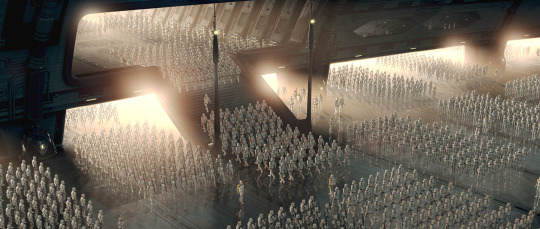
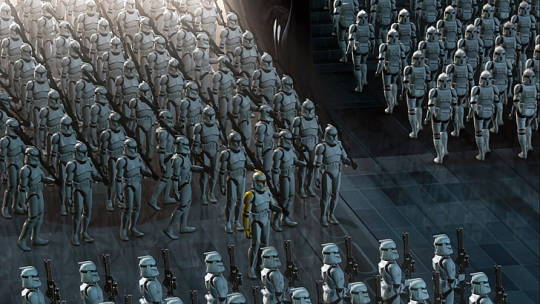
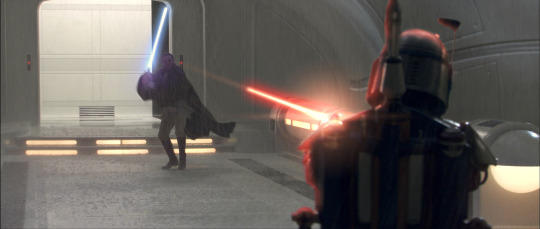



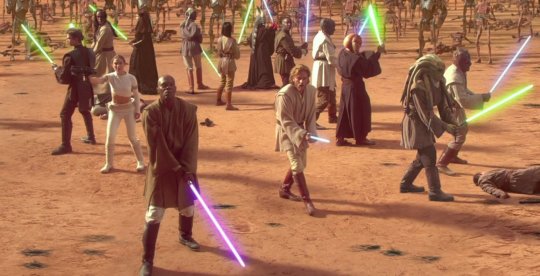
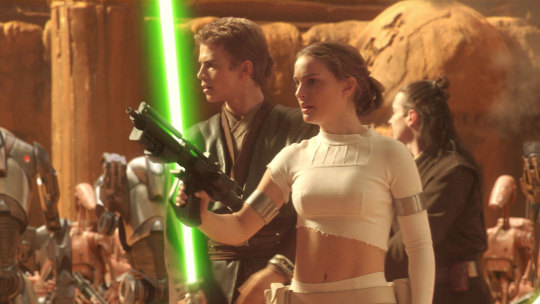
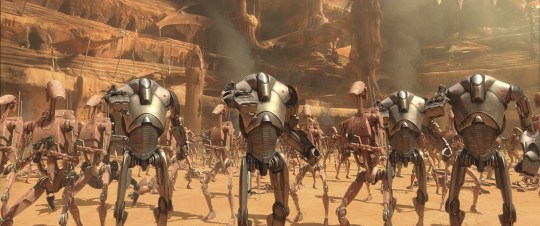

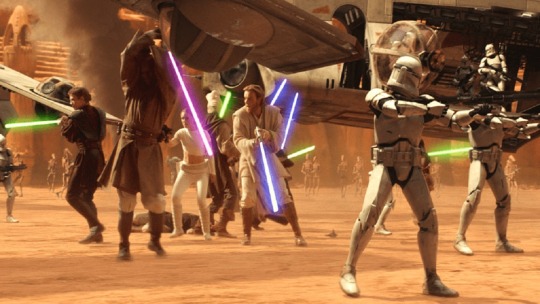

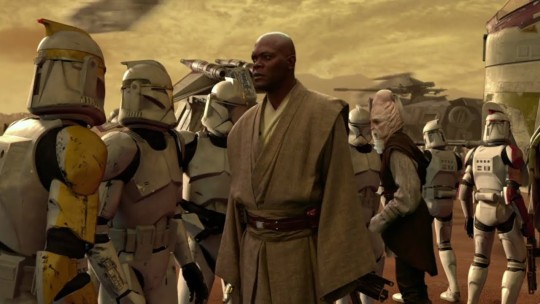

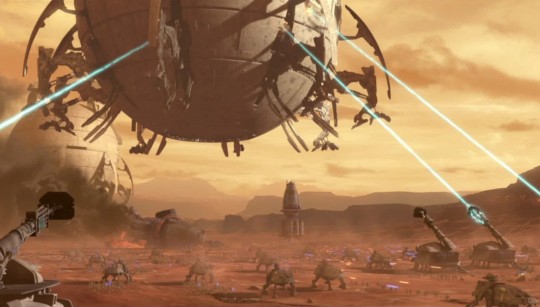
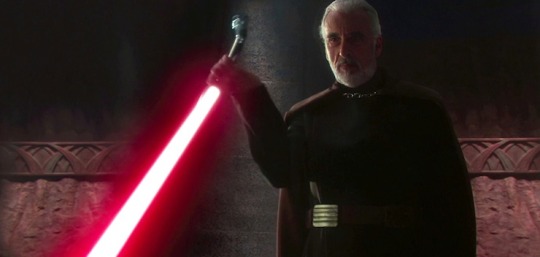



"A NEW WAY OF DOING THE SAME THING" -- "ATTACK OF THE CLONES" AT 20 AND THE DAWN OF DIGITAL CINEMA.
PIC(S) INFO: Spotlight on more films stills of "STAR WARS: Episode II – Attack of the Clones" (2002), American epic space opera film and the second installment of the Prequel Trilogy directed & co-written by George Lucas. 20th Century Fox/Lucasfilm Ltd.
Cinematography: David Tattersall
Visual FX: Industrial Light & Magic
FUN/AOTC FACT: "Episode II" employed the first digital cinema camera.
OVERVIEW: "To create a motion-picture without photographic film, Lucasfilm needed a camera equipped with digital sensors that captured and stored imagery on high-definition tape. The resolution of this imagery needed to at least match -- preferably exceed -- the quality of standard 35mm film. The ability to digitally capture, transfer, and edit motion-picture footage would drastically increase the efficiency and flexibility of the filmmaker, something Lucas was eager to do.
Video-based camera systems had been commonplace in broadcast media and other fields for years, but faced skepticism among some feature film cinematographers and directors. Lucasfilm first used Sony’s “digi-beta” cameras to shoot behind-the-scenes material on "The Phantom Menace." Select pick-ups from that movie were then captured using one of the company’s digital cameras, and were seamlessly integrated with the rest of the film.
For "Attack of the Clones," Lucasfilm convinced Sony to develop cinema cameras that captured digital footage at 24-frames per second, the same as traditional film cameras. This intrepid effort involved engineers from multiple continents, collaborating with Lucasfilm’s staff, including high-definition supervisor Fred Meyers, post-production and technical supervisor Mike Blanchard, and cinematographer David Tattersall.
The new cinema cameras were first-of-their-kind prototypes. Lucasfilm had barely a year to finalize their design with Sony, which included custom lenses built by Panavision. The four cameras arrived (serial numbers 00001 to 00004) only days before the commencement of shooting. The crew had to relearn their jobs, and the set was buried in miles of cable, but they worked. Even in the sun-baked deserts of Tunisia, they worked."
-- STAR WARS, "Clones at 20 -- 4 Ways "STAR WARS: Attack of the Clones" Helped Change Filmmaking," by Lucas Seastrom, May 10, 2022
Sources: Nerdist, YouTube, Slash Film, Pinterest, STAR WARS (official), Inverse, Twitter, The Denver Post, ILM, www.starwars.com/news/clones-at-20-4-ways-star-wars-attack-of-the-clones-helped-change-filmmaking, various, etc...
#STAR WARS#STAR WARS: Episode II#AOTC#Episode II: Attack of the Clones#Clone Wars#Prequel Trilogy#Attack of the Clones#Episode II#Sci-fi Fri#Anakin Skywalker#David Tattersall#STAR WARS: Episode II -- Attack of the Clones#Sci-fi/fantasy#Jango Fett#Clone Troopers#ILM#Bounty hunter#Kamino#Tipoca City#Director of photography#Clones#Clone Army#Industrial Light & Magic#Cinematography#Master Yoda#Jedi Order#Battle of Geonosis#Jedi Knight#Visual FX#First Battle of Geonosis
4 notes
·
View notes
Text

A Hora da Felicidade
EUA, 1941
George Marshall
6/10
Produção em Série
Pot o'Gold era um programa de rádio de sucesso na época, o primeiro a dar dinheiro aos ouvintes. O sucesso foi tal que ninguém largava o aparelho de rádio, à hora do programa. Os cinemas tiveram uma quebra tão grande na audiência, que anunciaram que dariam os $1000 na mesma, a qualquer espetador que fosse sorteado e por casualidade estivesse no cinema, à hora do programa.
A passagem de um concurso radiofónico de sucesso para o cinema não parece de todo lógica ou desejável, mas um simples truque para ganhar audiências.
O duo de protagonistas, James Stewart e Paulette Goddard, também parece um pouco improvável para uma comédia musical, embora reconheça que até nem se saem mal.
Os arranjos musicais são de excelente qualidade, da autoria de Basil Adlam, Frank de Vol e Dudley Chambers, sob a direção musical de Louis Forbes e contando com as harmónicas de Jerry Adler e Nat Bergman, dobrando as execuções de James Stewart.
Mas nem isso salva esta produção típica da época. O argumento é pobre e previsível, um mero pretexto para a sucessão dos números musicais. Os personagens carecem de profundidade, é um filme ligeiro, a todos os níveis, que se esquece dez minutos depois de ter acabado.
O próprio James Stewart, confrontado, anos depois, com uma das cenas mais marcantes do filme, quando é bombardeado com um jato de água na cara de um sifão, por Paulette Goddard, julgou tratar-se de uma sitcom, porque não tinha a menor ideia de ter feito aquela cena.
Não admira, o filme foi produzido ao mesmo tempo que Stewart filmava Ziegfeld Girl, com Judy Garland. O ator era levado de um estúdio para o outro, várias vezes ao dia, para conseguir filmar ao mesmo tempo os dois filmes.
Um produto em série, de Hollywood, para todos os efeitos, positivos e negativos.
Mass production
Pot o'Gold was a successful radio show at the time, the first to give listeners money. The success was such that no one left the radio set, at the time of the program. The cinemas had such a big drop in the audience, that they announced that they would give €1000 anyway, to any viewer who was drawn and happened to be in the cinema, at the time of the programme.
The transition from a successful radio contest to the cinema does not seem at all logical or desirable, but a simple trick to gain audiences.
The duo of protagonists, James Stewart and Paulette Goddard, also seems a little unlikely for a musical comedy, although I must admit that they don't even do badly.
The musical arrangements are of excellent quality, authored by Basil Adlam, Frank de Vol and Dudley Chambers, under the musical direction of Louis Forbes and with the harmonicas of Jerry Adler and Nat Bergman, doubling the performances of James Stewart.
But even that doesn't save this typical production of the time. The plot is poor and predictable, a mere pretext for the succession of musical numbers. The characters lack depth, it's a light film, on all levels, that you forget ten minutes after it's over.
James Stewart himself, confronted, years later, with one of the most striking scenes in the film, when he is bombarded with a jet of water in the face, from a siphon, by Paulette Goddard, thought it was a sitcom, because it had no idea of having done that scene.
No wonder, the film was produced at the same time that Stewart was filming Ziegfeld Girl, with Judy Garland. The actor was taken from one studio to the other, several times a day, to be able to film both films at the same time.
A Hollywood serial product, for all intents and purposes, positive and negative.
4 notes
·
View notes
Text
Cinemagooey Goes to Paris
In honor of the Festival de Cannes 2024, Cinemagooey salutes three magnificent French actors transcending generations.
Bonjour de Paris!

In the City of Lights, film is a serious art form. And rightly so, considering the French graced the world with several transformative firsts: the first movie projector (invented by brothers Auguste and Lois Lumière), the first use of special effects and fictional narrative (George Méilè) and the creation of New Wave, which burst onto the scene in the 1950's, introducing the auteur director and totally upending the art form (for a sampling, look up François Truffaut and Jean-Luc Godard).

An existential Jean Seberg in Jean-Luc Godard's New Wave movie, Breathless (1960)
In addition to introducing the cinematic world to these teutonic shifts, the France also bequeathed the universe with phenomenal actors. Here's a look at three luminous French actors who have delighted and thrilled movie audiences worldwide.
Catherine Deneuve

Catherine Deneuve, a star since the 1960's, makes us dumbstruck. When we find our words, we can only say "Elle est magnifique!" She is an institution, revered in France. Deneuve danced onto the world stage and into critics hearts at nineteen years of age in The Umbrellas of Cherbourg (1964). Her fame continued to skyrocket after the movie won the Palme d'Or at the Cannes Film Festival and was nominated for four Academy Awards in 1965.
Born in Paris to stage actors, Deneuve captured the imagination of directors as Roger Vadim and Jacques Demy, starring in several movies, including a film featuring older sister François Dorléac in The Young Girls of Rochefort (1967). Dorléac, a star in her own right, appeared in several movies and modeled for Dior before her tragic death in 1967 from a car crash that left Deneuve bereft.

The talented Francois Dorléac, who left the cinematic world too soon in 1967. She and Deneuve were close growing up and Dorléac served as Deneuve's role model in the industry
Deneuve's impressive career has spanned six decades. If you want to check out this incredible talent, try the erotic Belle de Jour (1967) in which Deneuve plays a housewife turned prostitute to escape domestic boredom; the American romcom The April Fools (1969) alongside the delightful Jack Lemmon; or the french comedy Potiche (2010), the story of a trophy wife who unwittingly takes over her husband's umbrella factory.

Deneuve, bored out of her gourd in Belle de Jour

Jack Lemmon romances Catherine Deneuve in The April Fools

2010's Potiche
In 1985, Deneuve was vaulted to goddess-like status when the French government named her as the official face of Marianne, the national symbol of liberty.

Deneuve as Marianne...or Marianne as Deneuve?
Today Deneuve is 80 years young and unstoppable. Deneuve wowed audiences at this year's Cannes Film Festival as she promoted her new film Marcello Mio which is about...get this...her real life actress/daughter Chiara Mastroianni who decides to dress and act like her father, actor/director Marcello Mastroianni (Deneuve's former love interest). Meta cinema, anyone?
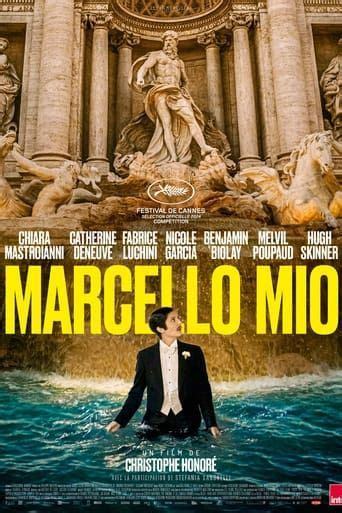
Marcello Mio...what a meta concept

The inimitable Catherine Deneuve at the 2024 Cannes Film Festival
Cinemagooey crowns Deneuve as the reigning Queen of French Cinema!
Juliette Binoche
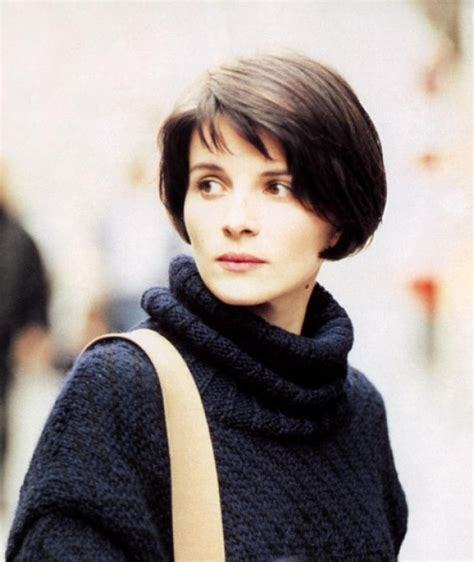
Juliette Binoche, a native of France, is a star of the world. She's a shimmering, international icon who has graced the silver screen in 60 plus films and was awarded both an Academy Award and a BAFTA for The English Patient (1996), a Cannes Film Festival Best Actress Award for Certified Copy (2010) and a César Award, France's highest film honor, for Three Colors: Blue (1993).
Born in Paris, Binoche was left bereft and abandoned as a child when her parents divorced and she was sent to boarding school, spending holidays with her grandparents while her parents pursued their own individual paths. Acting proved to be her salve and salvation and she amazed audiences from the beginning, starring in Jean-Luc Godard's Hail Mary (1985), a contemporary tale of the virgin Mary. She continued to appear in dozens of films, wowing audiences with such stunners as the reputed auto-biographical The Clouds of Sils Maria (2014) featuring Kristin Stewart and Chloë Grace Moretz and written and directed by Olivier Assayas.

As Hana in The English Patient

Hiking with Stewart in The Clouds of Sils Maria

Delivering a sumptuous performance in the foodie film The Taste of Things
She continues to dazzle in 2024 with the release of her latest film, The Taste of Things.
Always a darling at the Cannes Film Festival, this year she gave a moving, tear-filled tribute to Meryl Streep, presenting her with the prestigious Palme d'Or.

Binoche tearfully embracing Streep
Lea Seydoux

In 1985, just as Juliette Binoche was making a name for herself in the cinema world, Lea Seydoux was born in Paris to a well-known entertainment family - her grandfather is the chairman of Pathe, a major french film production and distribution company. As a child she rubbed elbows with Mick Jagger and Christian Louboutin. After abandoning her dream to be an opera singer, Seydoux turned to acting and quickly made a name for herself.
Seydoux played supporting roles in Inglorious Bastards, Midnight in Paris and Mission: Impossible - Ghost Protocol. But it wasn't until 2013's Blue is the Warmest Color that she became an international superstar, garnering a coveted Palme d'Or for the role (although not without some controversy).

Seydoux with Owen Wilson in Midnight in Paris

With Adèle Exarchopoulos in Blue is the Warmest Color.
Seydoux has since appeared dozens of films, including Wes Andersen's The Grand Budapest Hotel, No Time to Die, and Dune: Part Two.
Currently Seydoux can be seen in the sci-fi romance The Beast (2023), as a woman traveling through space and time to find true love.

Time traveling to the 1910's in The Beast
Deneuve, Binoche and Seydoux are the true femme trifecta of superstars.



#cinema#films#movies#catherine deneuve#juliette binoche#lea seydoux#cannes 2024#cannes film festival#belle de jour#the taste of things#blue is the warmest color#french actress
1 note
·
View note
Text
Day 04- Lighting in Films
Earliest Lighting in Film
In the late 1800s films were usually filmed during the day, as they purely used sunlight/ natural light. Indoor sets were built without a roof, or with a glass ceiling. As they did not utilize any artificial light (was introduced in 1900s) Light sources like Tungsten (1903) could not be used as the light rays it produced were predominantly from the red end of the spectrum. To which orthochromatic films of the era was relatively insensitive to.
L'Arrivee d'un train en gare de La Ciotat (1896) Train Pulling into a Station
Train pulling into a station, is a cinema legend where the audience, according to legend, were so startled by the realism that they ran out of the cinema.

La Fee Aux Choux (1896)
the first female director, Alice Guy-Blache, made her debut with La Fee Aux Choux fully utilized natural light only

Earliest use of (artificial) lighting in film
However D.W. Griffith changed the precedence by using soft artificial lighting in his work Enoch Arden by using a technique called bouncing or diffusing the light source of a shot.
Rembrandt Lighting Technique; Rembrandt lighting technique was inspired by Rembrandt’s oil paintings. This technique mimics the Tenebrism style, especially evident in Baroque era, that contains elements of dramatic lighting and violent contrasts of light and darkness. particularly created inverted triangled underneath the eye
Types of Lighting
Films lighting falls under one of two categories such as natural and artificial,
Sun, moon, fire, or fireflies fall under Natural light
Streetlights, neon lights, flashlights fall under Artificial light
However there are other categories such as 'Ambient light' which can either be artificial or natural, as it refers to any light the crew didn't bring on set (available lights). examples of this light can be streetlamps, sunlight, overhead lights at a restaurant, etc etc...
Although Ambient lights existence are an uncontrolled variable, you can still control how it hits the subject and what purpose it serves to your image, making it a motivated light.
Ambient light vs Natural light
Since these two terms will often be used interchangeably, there is a key difference between these two type of lights is that.
Not all ambient light is natural light, but all natural light is ambient light.

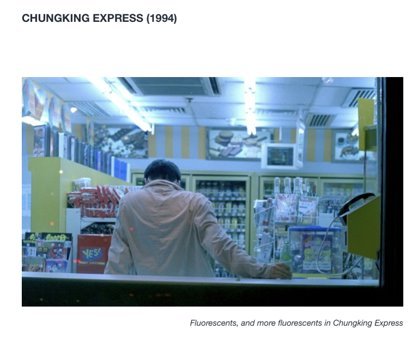
Chlose Zhao's work The Rider contains her signature visual palette on heavily relying on natural ambient light. Wong Kar Wai, director of Chungking express, on the other hand is known for his distinctive style of using artificial ambient light.

ambient light can also fall under a separate category, as seen in the above image, it can be referred to as 'Practical Lighting'; it is any light source that appears in the frame of a shot.
however, practical light doesn't have to be ambient, as it can be placed by a Gaffer.
Gaffer; head lighting electrician on set, who runs the entire electrical department of the crew and helps the director of photography achieve the desired shot
Practical Lighting is also closely related to Motivated Lighting. Motivated Lighting follows an approach which has logical reasoning for appearing the way it does in a shot.
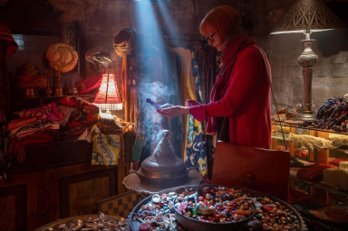
George Miller's work fully utilizes this approach as explained; As the lamps serve as practical lights on either side of the character, the right lamp provides some edge light on her back and the left provides a diffused red glow on her face (so it seems) its likely that the red light on her face may be provided by another less aesthetically pleasing light off frame.
the harsh blue spotlight shining down on the object of the character's attention. we can also safely assume that the red light on her face maybe coming through the window in the bizarre. therefore the light being motivated as well.
3 point lighting
this is the most basic lighting set up used in film and photography. It usually consists of Key light, Back light, and Fill light.
this method is the most standard method used in visual media, where they can illuminate the subject in any way they want while also controlling shadows produced by direct lighting


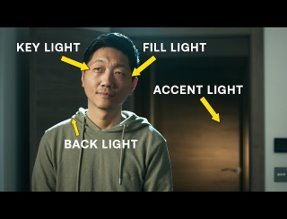
1 note
·
View note
Text
Urbanworld Film Festival Announces 2023 Lineup
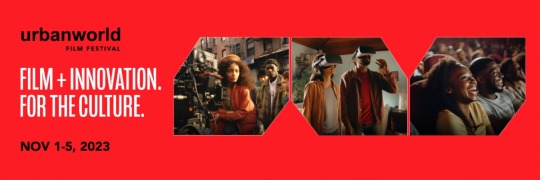
The 27th annual Urbanworld Film Festival's lineup has been announced for the event taking place the first week of November. The five-day occasion is November 1-5 at AMC 34th Street and the SVA Theatre in New York City. The schedule includes the world premiere of A Wu-Tang Experience: Live At Red Rocks Amphitheatre directed by Rza and Gerald Barclay. A conversation with Marvel Studios' The Marvels writer/director and Urbanworld album Nia Acosta is also planned. HBO returns as a Founding Partner and Warner Brothers Discovery is the Prestige Partner.
Stand Up & Shout: Songs from a Philly High School, an HBO Documentary Films feature, from director Amy Schatz and executive produced by Mike Jackson, John Legend and Ty Stiklorius of Get Lifted Film Co. will screen. Lawman: Bass Reeves, starring and executive produced by David Oyelowo about the first Black US Marshal is scheduled for viewing. Maxine's Baby: The Tyler Perry Story will be presented by Amazon Prime and National Geographic Documentary Films is having a youth screening of The Space Race directed by Urbanworld alum Lisa Cortés (Little Richard I Am Everything) and Diego Hurtado de Mendoza.
The work of more Urbanworld alums will be highlighted with To Live And Let Die starring Amin Joseph and Omari Hardwick; Young. Wild. Free. directed by Thembi Banks with Sanaa Lathan and Mike Epps; and Sira, a Berlinale audience winner directed by Apolline Traoré.
ESPN is presenting Black Girls Play from documentary team Joe Brewster and Michéle Stephenson. Disney+ is showcasing six short films from its Disney + Launchpad incubator program of filmmakers including The Ghost, directed by Erica Eng; Black Belts, directed by Spencer Glover; Beautiful, FL, directed by Gabriela Ortega; The Roof, directed by Alexander Bocchieri; Maxine, written and directed by Niki Ang and Project CC, directed by Cashmere Jasmine.
The almost 100 titles comprises shorts from several known artists including Yvonne Orji's directing debut with Jamaal and Zainab Jah's first film Reunion. Executive producer, Urbanworld alum and writer Nelson George will present Flower, a short film about ballerina Misty Copeland. Benny Boom's A Love Letter To Hip-Hop starring Tariq Trotter aka Black Thought and Part of Me: Anuar Khalifi by Yasiin Bey starring Yasiin Bey (fka Mos Def) are two of the music-oriented titles.
To purchase tickets and passes, visit urbanworld.org.
2023 Urbanworld International Film Festival Lineup
Spotlight Presentations
Lawmen: Bass Reeves – Created by Chad Feehan (Presented by Paramount+)
Maxine's Baby: The Tyler Perry Story – Directed by Gelila Bekele and Armani Ortiz (Presented by Prime Video)
Stand Up & Shout: Songs from a Philly High School – Directed by Amy Schatz (Presented by HBO Documentary Films)
The Space Race – Directed by Diego Hurtado de Mendoza and Lisa Cortés (Presented by National Geographic Documentary Films)
U.S./World Cinema Narrative Features
Chronicles of a Wandering Saint (Argentina) – Directed by Tomás Gómez Bustillo (New York Premiere)
Frybread Face and Me – Directed by Billy Luther (New York Premiere)
INKY PINKY PONKY (New Zealand) – Directed by Damon Fepuleai, Ramon TeWake (U.S. Premiere)
To Live and Die and Live – Directed by Qasim Basir
Young. Wild. Free. – Directed by Thembi Banks (New York Premiere)
Sira (Burkina Faso) – Directed by Apolline Traoré (U.S. Premiere)
Documentary Features
A Wu-Tang Experience: Live at Red Rocks Amphitheatre – Directed by Gerald K. Barclay and The RZA (World Premiere)
Bike Vessel – Directed by Eric D. Seals (New York Premiere)
Black Barbie: A Documentary – Directed by Lagueria Davis (New York Premiere)
Brief Tender Light (Ghana/USA) – Directed by Arthur Musah (New York Premiere)
Disney Launchpad Shorts (Presented by Disney+)
Beautiful, FL – Directed by Gabriela Ortega
Black Belts – Directed by Spencer Glover
Maxine – Directed by Niki Ang
Project CC – Directed by Cashmere Jasmine
The Ghost – Directed by Erica Eng
The Roof – Directed by Alexander Bocchieri
POV Showcase (Presented by WNET)
By Way of Canarsie – Directed by Emily Packer and Lesley Steele
Freshwater – Directed by dream hampton
Sol in the Garden – Directed by Emily Cohen Ibañez and Débora Souza Silva
Still Waters – Directed by Aurora Brachman
The Dream of a Horse (Iran) – Directed by Marjan Khosravi (New York Premiere)
U.S. And World Narrative Shorts
A Version – Directed by Asad Farooqui (New York Premiere)
August Visitor – Directed by Ifeyinwa Arinze
Becoming – Directed by Tramaine Raphael Gray
Children of Light (Korea/USA) – Directed by Minkyu Kang (New York Premiere)
Choices – Directed by Justin Luis Denis (World Premiere)
Cousins – Directed by Karina Dandashi
Cut Me If You Can – Directed by Nicolas Polixene and Sylvain Loubet (New York Premiere)
Death & Ramen – Directed by Tiger Ji
Don't Touch My Hair – Directed by Matthew Law (New York Premiere)
Don't Wait Up For Me – Directed by Alain Alfaro (New York Premiere)
ExpoZure – Directed by Kimson Albert (World Premiere)
Hématome (Belgium) – Directed by Babetida Sadjo
Homing – Directed by Ricardo Varona (New York Premiere)
House Party (United Kingdom) – Directed by William Alexander Boyd III (U.S. Premiere)
Incomplete – Directed by Zoey Martinson
I Held Him – Directed by Hans Augustave
JAMAAL – Directed by Yvonne Orji (World Premiere)
Jerome – Directed by Gianfranco Fernández-Ruiz (New York Premiere)
LOOK BACK AT IT – Directed by Felicia Pride
Lunchbox – Directed by Anne Hu
Magic Ring – Directed by Alex Ashe
My Two Left Feet – Directed by Damian Gonzalez (U.S. Premiere)
October Mourning – Directed by Frederick Thornton (New York Premiere)
Reunion – Directed by Zainab Jah and Tim Naylor (New York Premiere)
Spaceship – Directed by Jorge G. Camarena (New York Premiere)
The Burden – Directed by Tish Arana (New York Premiere)
The Fore-men (Canada) – Directed by Adrian Bobb (East Coast Premiere)
The Old Young Crow (Japan) – Directed by Liam LoPinto (New York Premiere)
TikTok Challenged – Directed by Ivan Rome
YELLOW (United Kingdom) – Directed by ELHAM EHSAS (East Coast Premiere)
Documentary Shorts
Black Girls Play: The Story of Hand Games – Directed by Joe Brewster and Michèle Stephenson (Presented by ESPN Films)
Duckworthy – Directed by M.G. Evangelista (New York Premiere)
I Was a Soul Train Dancer – Directed by Timiza Sanyika (New York Premiere)
Merman – Directed by Sterling Hampton IV
PART OF ME - Anuar Khalifi BY Yasiin Bey (Spain) – Directed by Jordi Esgleas Marroi (New York Premiere)
OVER THE WALL – Directed by KRYSTAL TINGLE
SLICE – Directed by Zaire Love (New York Premiere)
The Big Idea: Birth Without Bias – Directed by Sarah Klein, Tom Mason (New York Premiere)
Things Long Left Unsaid – Directed by Antonia Thornton (New York Premiere)
WA GUEJJ GUI - OCEAN PEOPLE – Directed by Clé Hunnigan (World Premiere)
Animation Shorts
Bridges – Directed by Jonathan Davenport (World Premiere)
BURNING RUBBER – Directed by Christopher Fequiere and Dara King (New York Premiere)
Lil’ Ruby – Directed by Bartek Kik (New York Premiere)
Perfect City: The Bravest Kid – Directed by Shengwei Zhou (East Coast Premiere)
Tomato Kitchen (China) – Directed by Junyi Xiao
Experimental
BET Presents: A Love Letter to Hip Hop – Directed by Benny Boom
FLOWER – Directed by Lauren Finerman
It Smells Like Springtime – Directed by Mackie Mallison
Quiet As It's Kept – Directed by Ja'Tovia Gary (New York Premiere)
Paradise Ft. Terrace Martin & Alex Isley – Directed By child. (Presented By Jill Newman Productions)
Young Creators Showcase
BURNT MILK (Jamaica) – Directed by Joseph Douglas Elmhirst (U.S. Premiere)
Of Silence and Song – Directed by Dai Leyi (New York Premiere)
Shallots and Garlic / Bawang Merah Bawang Putih (Indonesia/Canada) – Directed by Andrea Nirmala Widjajanto (New York Premiere)
Xiaohui and his cows (China) – Directed by Xinying Lao (New York City Premiere)
UNERASABLE – Directed by Déon Ragin (World Premiere)
Screenplays
I Don’t Dream in Spanish Anymore – Written by Missy Hernandez
Long Live AJ – Written by Marvin Van Buren
Panorama Connection – Written by Nicole Weaver
The Washroom – Written by Omar Al Dakheel and Elie El Choufany
1 note
·
View note
Text
Indie Review - 'THE VACCINE WAR' (2023) ! ... (*4.9/5)
IndieReview:
'THE VACCINE WAR' (2023)!
Indies * - 4.9/5!
This is a movie, not just today's Bollywood, but Hollywood too will undeniably appreciate!
For a film of a quality, that the new legend block in Hollywood, comprising people like George Clooney, Matt Damon, Ben Affleck, & many others down the line in 21st c., of a more overtly cinematically cerebral-intellectual bent & grain, have made fashionable in modern cinema!
ONE OF THE ONLY INTELLECTUAL WAR MOVIES TO EMERGE OUTTA INDIA!
Yet a genre not knew to the director, who infact is among the only Indian practitioners of this otherwise 'cool' western genre, since it's inception, & to consistently masterful effect!
A RARE, TRULY REAL, & IMMERSIVE BIRD'S EYE ENCAPSULATION, OF THE TRIALS & TRIBULATIONS FACED, BY THE MOST UNKNOWN, SEEMINGLY ORDINARY, YET PROFOUNDLY BLESSED & EXTRAORDINARILY CAPABLE SET OF SUPERHEROES, IN ONE OF THE MOST THANKLESS PROFESSIONS IN THIS WORLD ECOSYSTEM, THAT INDIA WILL PERHAPS NEVER KNOW OF, OR BE ABLE TO THANK ENOUGH FOR IN UTILIZING THEIR LIFE-SAVING SERVICES IN!
The group of Indian female scientists, that came together to give India, in many expert estimations, the safest & most effective Covid vaccine in history! And at record pace & time!
A creditably detailed look, especially involving getting panacea for a plight, every single human on this planet endured with pun-intended bated breath, for nearly a year since getting locked on their own ever-crumbling & oh so withering planet, in utter hopelessness & despair!
A CREDITABLE GROSS ACCOUNT OF THE SCIENTIFIC SUPERHEROES THAT SAVED US ALL, FROM NEAR CERTAIN PLANETARY DISASTER!
Beginning with the entire journey of these set of virologists, from first day of patient infection or Patient Zero, to 3 yrs down the line, involving trips to Iran to test & rescue stranded Indians abroad, followed by the arduous task of isolating the virus & trying to find it's vaccine! Also involving entertaining trips to deep forests of Nagpur in search of the most peculiar & conducive group/species of guinea-monkeys anywhere in the world, for ideal testing & med development.
All marshalled into machine precision, by the ever-engrossing & most projectable Nana Patekar, in clearly the most life-like role of his Hindi (if not Marathi) career, bringing unseen character graph & wholesomeness to his otherwise superbly histrionics-driven massy Bollywood career! Followed by Pallavi Joshi in easily the greatest role & performance of her entire career, in strong contention for even the Best Actress Award @ Indies this year (infact spoiler alert, a certainty to win it this year, take it from me now itself!), for her brilliantly real portrayal of the 2nd person in charge of all proceedings in this invisible war. Other highly praiseworthy acts include Nivedita Bhattacharya & Girija Oak, as 3rd in-charge! As also a highly noticeable villainous turn by the ever-reliable & impactful Raima Sen!
A film that will make each Indian re-live it's own personal Holocaust, at hands of a outta control near-invisible microcosm/virus, a near-artificial intelligence hell-bent on wiping all humanity outta it's sight for good!
INDIA DID IT! … AND THEY DAMN WELL MADE A FANTASTIC AWARD-WORTHY FOR REAL FEATURE FILM ON IT TOO, TO BOOT!
Sufficiently accurate light is thrown on India's hesitancy in acquiring foreign vaccines (for reasons, as laid out in end, of unacceptable & near-slavish terms of agreement, but also including their own internal battles of efficacy & authenticity, as also unbecoming & not investigatively unfounded, allegations of deep malintent sown in their very systemic roots).
If to nitpick, one could say, that a few more scenes depicting the mass vaccine-production by Bharat Biotech, as well as, one or two more completing the whole process till first vial in existence, & the record vaccination drive (with novel digital use) been nicer! But 2.5 hrs of infotaining fun, was pretty awesome as it is, & sufficient in itself, nonetheless!
Congratulations on a wonderful fun documentation, of one of India's greatest most glorious & certainly youngest freshest chapters, in the longest journey of any earthling nation through humanity!
BHARAT MATA KI JAI! .. BHARAT KI VAIGYANIK MATAON KI JAI! 🙏
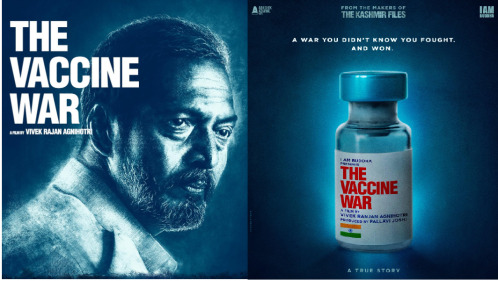
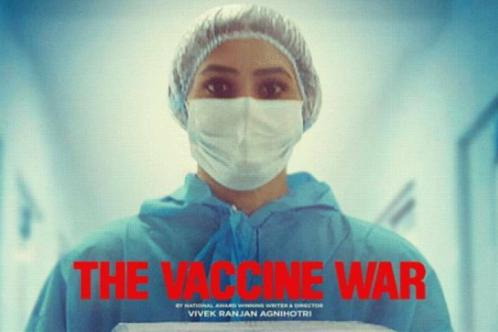
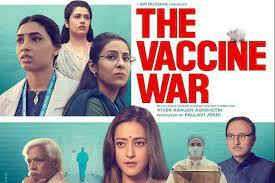
0 notes
Note
16 with bob pls
an anon after my own heart 🫶🏻 when i rbed that list i immediately thought of 16 w bob. hope this is up to snuff!!
16 - meeting in a cinema, both there with their friends, but sitting next to each other and accidently grabbing each other’s hand when something scary happens on screen
word count - 1.1k

You didn’t even want to go see this stupid movie. You’d wanted to go see that new Billy Eichner romcom, or that new movie with Julia Roberts and George Clooney. But as usual, your friends hadn’t listened, and now you were stuck in a crammed theater watching Georgina Campbell follow Bill Skarsgard into the very creepy and very gross underground tunnels of their Airbnb.
To your right sat your two best friends, giggling with excitement at each scare while you flinched and gasped, hating it. To your left was a group who had come in partway through the trailers, whispering and apologizing and squeezing into their seats. You were shoulder-to-shoulder with a guy who was sitting so still you worried he might have stopped breathing. That made you feel a little better.
On screen, Georgina Campbell screamed out for Bill Skarsgard again. You flinched, hissing under your breath, “Oooh, be quiet, be quiet, be quiet!”
Your friends giggled excitedly, one of them grinning as they watched through their fingers.
When Bill Skarsgard finally reappeared, the whole theater gasped. You gripped the armrests of your seat so hard it hurt, squeezing your eyes shut. Next to you, the guy had put a hand over his heart, and in the dim light it almost looked like he was smiling—or was that a pained grimace?
“There’s something down here,” whispered Bill Skarsgard.
“No,” you groaned, scrunching down in your seat, your hands still clenching the armrests.
The whole theater was quiet, waiting, holding its breath. One of your friends had their fingers pressed tightly to their lips, their eyes wide. Next to you, the guy reached up and pushed nervously at his glasses.
A creature came screaming out of the darkness with a loud musical sting, and the theater shrieked in alarm.
“Fuck!” yelped the guy next to you, jumping hard in his seat as you did the same, nearly folding in half. A hand closed over the one you had clenched around the armrest, squeezing tight, but then lifted as soon as it had happened.
“Sorry,” the guy whispered, glancing at you nervously.
“It’s okay,” you murmured back, drawing your knees up to your chest. “I’m scared, too.”
He exhaled a shaky laugh, attempting to smile at you.
The movie continued—apparently Justin Long is here, too?—but before long, the characters were back in those terrible tunnels and you had your legs up in the chair again. When there was another sharp musical sting, you sucked in a sharp breath and reached out, grabbing a fistful of the guy’s sleeve in alarm. You let go quickly, squeaking out a quiet, “Sorry,” of your own.
“You’re okay,” he whispered back, his eyes huge and fixated on the screen. He reached over and absently patted your hand, like he didn’t even notice he was doing it.
At that exact moment, Justin Long screamed and started running from whatever was chasing him, and you and the guy both flinched. His hand tightened on yours, and before he could pull away, you laced your fingers through his and held on tight, grateful for the grounding presence.
He turned in the dark, his eyes wide and surprised behind his glasses. The light from the screen filtered over his face, revealing the bluest eyes you’d ever seen, and you realized with an embarrassed jolt that he was really cute.
You whispered, “Is this okay?”
He nodded and half-smiled, turning back to the movie and shifting in his seat so that it was easier for you two to hold hands. A pleased flush of warmth spread across your cheeks as you did the same, leaning against the armrest between you and tucking your legs up in the chair.
By the time Justin Long and Georgina Campbell had started to desperately climb the water tower, you were as close to your seat neighbor as the movie theater chairs would allow. Your hands were still intertwined, and at some point when you’d buried your face in his shirt, his other hand had come around to rest on your leg, where it still remained.
The credits finally started to roll and the lights in the theater came up. You stretched out your legs, wincing at how tight your muscles were from all the clenching you’d been doing. You were the first to disentangle your fingers, and you immediately regretted it.
“Hi,” you laughed nervously, turning in your seat to look at him.
“Hi,” he said back, letting out a nervous little chuckle to match yours.
You held out your hand and introduced yourself. He laughed again before shaking your hand and saying, “I’m Bob.”
“Bob?” you said, fighting back a smile.
He nodded. “Just Bob.”
“Well,” you said, “it’s very nice to meet you, Bob.”
“Yeah. You too,” he added, smiling shyly. Behind him, his friends were starting to gather their things and stand up. He glanced over his shoulder quickly before saying, “Oh, uh, I guess we’re about to head out, but it was—you know—thanks for—”
You cut him off by turning to your friends, who were watching your interaction with matching knowing smiles, and asking, “Do either of you have a pen?”
They handed you one in record time and you turned back to Bob. “Give me your hand,” you instructed.
“Okay.” He pushed up his sleeve and proffered a bare expanse of forearm. You made sure to keep your thoughts strictly above board as you scribbled your phone number onto the inside of his wrist. Then you squeezed his hand warmly and leaned over, planting a kiss on his cheek. When you pulled away, he had a dumbfounded smile pulling at his mouth.
“If you want to go see another horror movie or anything, let me know,” you said, sounding a lot more confident than you felt. “Sitting with you made it tolerable.”
“Just horror?” he asked, still looking at the ink on his arm. “I was thinking maybe a rom-com next time.”
You were so busy watching the sweet, sheepish expression on his face that it took you a moment to realize you were grinning. You nodded. “A rom-com sounds nice. I’ll see you later, Bob.”
As you stood up and made your way out of the theater with your friends, you watched Bob go back to his own group, where they all enthusiastically pounded him on the shoulders while he blushed, tugging his sleeve carefully back down to hide your phone number. Your own cheeks were warm as you lowered your head and followed your friends back into the daylight, figuring that maybe that horror movie wasn’t so bad after all.
#bob floyd#robert bob floyd#bob floyd x reader#bob floyd x you#bob x reader#bob floyd fic#bob floyd fanfic#bob floyd blurb#bob floyd imagine#bob floyd fluff#robert bob floyd x you#robert bob floyd x reader#vinny fics
222 notes
·
View notes